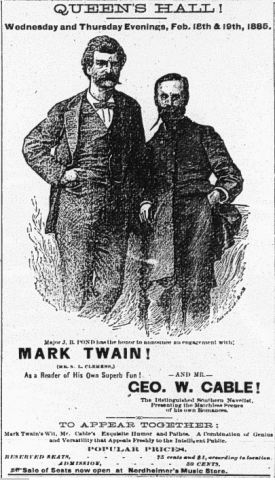
INTRODUCTION:
George Washington Cable and Samuel L. Clemens first met in 1881. It appeared that he stood at the threshold of a brilliant career. (pg3 Cardwell). Cable had just caught the attention of the public with his two fresh, promising volumes [from 1879 and 1880]. Although his thinking on questions of race and caste had taken a liberal bias in the 1860's he was not yet marked as a forthright, vocal advocate of civil rights for the Negro and had not yet been widely attacked by southerners for the nonconformist views which were to make him notorious and obnoxious among them. (pg2 Cardwell). Their friendship developed very quickly, culminating in and nearly exploding during their joint lecture tour in 1884-85. (pg 3 Cardwell). Twain himself was green at the job. Believing that all he needed to do was to get out on the platform and read from the book, he did just that and made a botch of it. After a week's experience, he put the book aside and delivered his pieces from memory. Gradually the pieces transformed themselves into flexible talk'. (pg 16 Cardwell [Mark Twain in Eruption pp 215-217])
Mark Twain had not lectured since 1872, the year Roughing It was published. Adventures of Huckleberry Finn was published in 1885. Twain wanted it promoted so he hired Major J.B. Pond to act as agent and the author George Washington Cable to accompanying him on stage. Andrew Levy, in Huck Finn's America, paints a picture of Twain's entrance on the stage for the first show of the tour: The Opera House in New Haven, Connecticut, November 5, 1884 at about 8:40pm.
He walked slowly. One side of him dragged, limped. Perhaps someone in the audience laughed a little nervously, and Twain looked up suddenly. He seemed startled to discover that an audience was present. This caused more people to laugh. Twain now seemed mortified. A few more people laughed, uncomfortably, hopefully.
Wednesday, November 5, 1884: New Haven, Connecticut -- Opera House
 Sam was in Hartford, CT during the day but the tour began in New Haven that evening, with Livy in attendance. "The trip's my last--forever & ever" Mark Twain Day By Day
Sam was in Hartford, CT during the day but the tour began in New Haven that evening, with Livy in attendance. "The trip's my last--forever & ever" Mark Twain Day By Day
"The large and cultivated audience enjoyed the rare treat presented by George W. Cable and Mark Twain in the New Haven Opera House last evening. All the selections were rare and finely rendered. The first selection, "Music of Place Congo," was read by Mr. Cable in an apt style. The second selection, "Adventures of Huckleberry Finn," by Mark Twain, fully sustained the admirable reputation of the other parts of the programme. "Scenes from Dr. Sevier," by Dr. Cable and "Ghost Story" and "A Trying Situation," by Mark Twain, deserve especial mention. The entertainment was a success in every particular and the public will be repaid at any time for making efforts to hear these two gentlemen who are now appearing together." See review at Touring with Cable and Huck
Thursday, November 6, 1884: Orange, New Jersey-- Music Hall
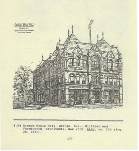 East Orange Gazette, November 13, 1884
East Orange Gazette, November 13, 1884
Mark Twain and George W. Cable
A very novel and pleasing entertainment was given in Music Hall on last Thursday evening, consisting of readings by Messrs. Samuel L. Clemens, (Mark Twain,) and George W. Cable. The former is widely known as one of the great American humorists, and the latter is the author of a number of stories of Creole life in Louisiana, which, published in the "Century," have attracted much attention. The novelty of hearing authors read their own compositions, together with the celebrity of both gentlemen, attracted a very large audience. Mr. Cable was the first to appear. He is a small man with a large forehead, and pleasant, animated manner, and his first selections, which were the rendering of several Creole songs, were very acceptably received by the audience. He then gave a rendition of "Raoul Innerarity," from this book "The Grandissimes." He was followed by Mark Twain, whose appearance was totally different from that of Mr. Cable. He is a man of considerable height with a decided stoop to his shoulders. His head, which is covered with bushy iron gray hair, is quite large and he speaks with a peculiar drawl in perfect keeping with the style of his compositions. After a humorous reference to the political election, Mr. Twain proceeded to give a "telephone talk," and for an encore gave some of the difficulties in learning the German language. Mr. Cable followed with another selection from the "Grandissimes" and one from another work entitle "Dr. Sevier," both of which were highly appreciated. Mark Twain then gave readings from some unpublished sheets concerning the famous Colonel Sellers, whose visionary projects excited the uncontrolled mirth of the audience. He also, after bringing the audience into the proper mood for its reception, told a ghost story, the termination of which was decidedly startling to the audience. The entertainment was much enjoyed by all those present and was very successful financially, as well, the house being crowded in every part.
PDF of Newspaper Provided by the East Orange Public Library
Friday, November 7, 1884: Springfield, Massachusetts--Gilmore's Opera House
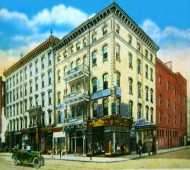 Mark reported to Livy on a poor reading in Springfield on November 7. (pg 16, Cardwell [Love Letters, p 366. The program at Springfield was experimental])
Mark reported to Livy on a poor reading in Springfield on November 7. (pg 16, Cardwell [Love Letters, p 366. The program at Springfield was experimental])
Cable reported that the performance was “against terrible odds—brass music & fire-works in front of the hall, vast crowds blocking the streets and cannon firing directly in the rear of the house” Mark Twain Day By Day
Springfield Republican, Nov. 8, 1884 page 4.
The Twain-Cable Evening
"The joint venture of Mr. Cable and Mr. Clemens at the Opera House last evening was greeted by a very considerable audience, and bothered by the very considerable noise on the streets, to a degree. But it was a successful entertainment, the principal regret felt being that Mr. Cable did not appear in such variety of effects as [??] previous visits here, and as the program [promised?]. He presented himself first and impressed every one as a romantic figure, a sort of knightly ideal, with his broad and overhanging forehead, his brilliant eyes and his long moustache over his full [brown?] beard. He was warmly cheered, and after gracefully [???]ing the "[???] of Place Congo" in deference to the superabundant music outside, he [re?lied] the story of "Possou June." It was done with far greater elocutionary effect than when he first read it here, but he has introduced into the text certain little variations (to make it more intelligible to his audience, perhaps,) which hurt the artistic quality. Mr. Cable's voice has strengthened by practice, and he is now able to fill the house with his slenderest tone, and to produce what effect he will by a development of his dramatic power. After he had concluded the narrative of the Florida parson he gave the specimen of the music of "Place Congo", and sang it with such fine expression and so good a voice that the audience felt defrauded to hear no more of it. When "Mark Twain" appeared there was a hearty welcoming applause, as there must always be for one whose humor has delighted more people than that of any other man. Mr. Clemens, in evening dress rather more pronounced than Mr. Cable's, and with a fine exaggerated air of fluidity at his entrance upon the stage, was a great contrast to his associate. He can hardly be described, with his head of roughened curling hair, his vigorous nose, his sardonic moustache and cleft chin, - but he looked the humorist, as he no doubt he intended to. He at once informed the audience that the programs which had been distributed at great cost for their convenience were of no particular use, and he explained why they were not, at some length. Then he proceeded to prove that he was right about it by giving a number of readings not one of which was mentioned on the program. He gave a discussion between "Huckleberry Finn" and the negro boy Joe (in the new book): he narrated and illustrated his struggles with the German language and its unreasonable genders; he related one of Col Sellers[?] projects--there were millions in it--and slightly adapted it to the immediate exigencies of the political situation; he described his adventure with the young woman whom he pretended to know and didn't, and who came up with him so [handsomely], and he wound up with telling a ghost story after the manner of an old negro. He positively convulsed his hearers with the deliberate fashion of his speech and the peculiar ways in which he indicated their proper emotions by the inflections of his voice. Mr. Clemens is undoubtedly as much a humorist in the reading as in the writing of his extraordinary contributions to our literature, and he gave to the familiar narratives an added touch of character."
Saturday, November 8, 1884: Providence, Rhode Island--Blackstone Hall
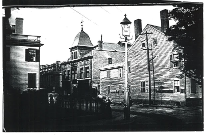 In the afternoon the audience filled about two-thirds of the sittings. The hall was nearly filled by a select and cultured audience at the evening entertainment. (From Providence Daily Journal 1884: November 10)
In the afternoon the audience filled about two-thirds of the sittings. The hall was nearly filled by a select and cultured audience at the evening entertainment. (From Providence Daily Journal 1884: November 10)
Mr. Clemens delighted the audience with some of the enthusiastic and visionary projects of the famous "Col. Mulberry Sellers," for the materialization of the waste human forces floating about in the atmosphere, and only awaiting such a scientific genius as that of Sellers to make them of incalculable benefit to the world at large, while accumulating untold millions for the inventor. The humorist introduced one variation for the occasion, which was greatly appreciated and warmly applauded, being the proposition of Col. Sellers to materialize voters and enter upon political life, because the dead voters capable of materialization would so outnumber the live ones that there would be no uncertainty as to the result, and no waiting four or five days before we could find out who was elected.
Transcription provided by Touring with Cable and Huck
Cable's Nov. 9 to Lucy:
"Yesterday’s double duty did not hurt me at all. I never did my work before so brilliantly. You will be proud when I tell you that Mark & I seem to divide the honors as nearly even as two men well could. Mark seems greatly pleased with my work, as I am with his. As I came off the platform yesterday afternoon followed by a tremendous clatter of applause & he met me in the door as he was going to take my vacated place he exclaimed, “superb! superb!” Even Pond, sitting back at the rear of the house, applauded — first time he has ever done it. One lady — when I read “Mary’s Night Ride,” quite lost herself and wrung her hands hysterically." [Turner, MT & GWC 51-2].
Sunday, November 9, 1884:
Sam addressed two letters from Providence on this date, as listed in the MTP
Monday, November 10, 1884: Melrose, Massachusetts--Town Hall
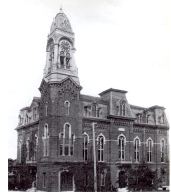
a crowd so large that extra seats had to be moved into the hall (pg16 Cardwell)
Mark Twain's dry, purely American humor has aroused merriment for years and has developed a field of fiction in which no other author has ventured, at least without seeking aid from some second source of literary power to conceal the weak points of his imitative "Mark Twain" style. The humor is notably Yankee; no English reader of Punch could thoroughly appreciate the rich undemonstrative humor of Innocents Abroad--that is, if he takes Punch as his standard. Mr. Cable, on the other hand, has but recently appeared to present us with a series of character sketches treating of a race which though resident upon American soil are yet but little understood or even known by Americans outside of a few Southern States. His writings are in that respect foreign, and appeal less to the natural recognition of a native American reader; for that very reason, however, the great popularity which they have gained more commendation to the writings. As in their writings, so in their appearance, their manner, their style of delivery, their intonations and gestures, these two authors display pecularities different from each other, and yet both interesting and amusing.
The Boston Journal, 1884: November 11 transcribed by Touring with Cable and Huck
Tuesday, November 11, 1884: Lowell, Massachusetts--Huntington Hall
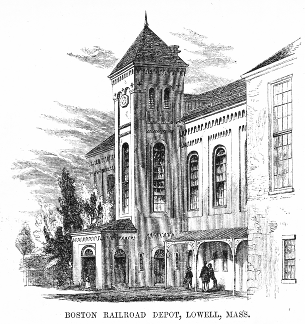 This listing is found in Chronology of Speeches but is given as November 12 in Touring with Cable and Huck
This listing is found in Chronology of Speeches but is given as November 12 in Touring with Cable and Huck
The Lowell Daily Courier published a review of the show on November 12, 1884, thus establishing the date of the show as November 11.
"Mark Twain followed and he, too, had something to say about the programme, and his determination not to be bound by it. This appears to be a part of the performance, as the readers have objected in other places to the bill and changed it to suit their own notions. Mr. Clemens proved a decided change from the style of his partner. While Mr. Cable was refined to a degree, and of polished manner, the witty Connecticut man was much broader in his humor and less graceful in his work. He was not free from affectation, and some detected an imitation of A. Ward. He told the story of “King Sollermun,” related an anecdote not on the bill, and read the “Tragic Tale of the Fishwife,” “A Trying Situation” and “A Ghost Story.” The laughter was constant throughout, and the audience evidently found their enjoyment of the Twain characteristics much increased by the peculiar delivery of the reader. The explosive ending of the ghost story startled half the people from their seats. Altogether the performance was very enjoyable."
Sam was apparently staying in Boston as he addressed a letter to Pond from there on this date [MTP].
Apparently after the Lowell show Sam wrote to Livy from Lowell, dated November 12
"Livy Darling, only a word, to say I have not heard from you since I left you stricken & lonely in the forever accursed town of Springfield—the only town where we have suffered a defeat. I have not heard from you, & it has depressed me all day. It is now midnight, & has been a hard day. Good night my love. Sam [MTP]."Mark Twain Day By Day
Wednesday, November 12, 1884: Waltham, Massachusetts--Rumford Hall
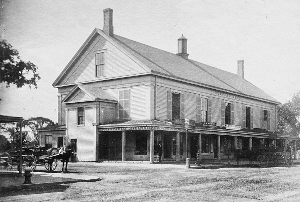 This listing is found in Chronology of Speeches but this date is given as Lowell, MA in Touring with Cable and Huck
This listing is found in Chronology of Speeches but this date is given as Lowell, MA in Touring with Cable and Huck
"Music Hall was well filled last evening on the occasion of the second of the present season's course of Rumford Institute entertainments. Mr. Geo. W. Cable, the popular author of the serial story now publishing in the “Century,” gave several scenes from that work with fine effect, and was listened to with the hushed stillness of intense interest, especially in the closing graphic scene, while Mark Twain, for it was the genial humorist universally known under this name rather than the fine gentleman known in the social circles of the city of Hartford as Mr. Clemens, read several highly amusing sketches from his own writings, to the great amusement of the audience, manifested by almost incessant applause. Upon the whole this second evening of the course, seemed to meet with as much favor as did the first evening with the popular and charming Barnabee troupe."
Thursday, November 13, 1884: Boston, Massachusetts--Music Hall
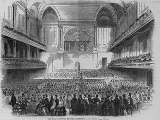 First joint reading in a big city to “a very large audience”. (pg 17, Cardwell)
First joint reading in a big city to “a very large audience”. (pg 17, Cardwell)
Touring with Cable and Huck provides reviews from three Boston papers; The Boston Globe, Post and Transcript.
From the Boston Herald, November 12, 1884, page 4:
NOTES
"Mark Twain (Mr. S. L. Clemens) and George W. Cable are much puzzled to fix upon their programme of readings at Music Hall tomorrow evening. Mr. Clemens says that the selections announced in these columns are all right, but as they may be made to last from one to six hours, according to circumstances, he is in doubt about retaining them. He promised, however, that the audience shall be told by a reliable person when the show is over so that there need be no doubt about when to leave the hall."
Included in the Boston, Massachusetts page (linked here) is a Rashoman tale of Twain and Cable trying to drown a crazy woman. Reported in the Boston Herald Supplement for November 13, 1884
This is also the date that Sam became a member of the Montreal Snow Shoe Club. Mark Twain Day By Day
Friday, November 14, 1884: Brockton, Massachusetts--Opera House

Cable wrote home:
"We had a great time last night. Twenty-two hundred people applauding, laughing & encoring, In Music Hall. This morning Clemens & I go out to make a call or two. Tonight we read in Brockton. Tomorrow afternoon & night in Chickering Hall. Our show is a great success. It isn’t easy to write as Mark Twain is singing “We shall walk through the Valley” [Turner, MT & GWC 59.]"Mark Twain Day By Day
I don't currently have an image of the Brockton Opera House so I'm going to leave the image of the interior of the City Theater, which is interesting in it's own right. see City Theater
EMail correspondence from Barbara Schmidt Thu, 26 Feb 2015 : "As to Brockton, MA -- I did find a reference to a letter SLC wrote to Pond complaining that the Brockton venue had not been advertised sufficiently, and thus had a low turn out." I don't know if the Twain-Cable Tour visited City Theater or not but it does seem to be a good fit.
The Brockton Historical Society provided me with PDFs of some newspaper clips about this event. It took place in the Opera House to a "regrettably" small audience
"OPERA HOUSE.-- It is to be regretted that "Mark Twain" and Mr. George W. Cable were greeted by such a deplorably small audience at the Opera House last Friday. It was a reflection upon the literary taste of our people that so few were eager to come face to face with these popular American writers. Mr. Cable's readings were entirely from his latest novel, "Dr. Sevier," and were introduced with one of the wild, incoherent but musical Creole songs sung years ago in the Place Congo, New Orleans, by the African slaves. The readings introduced Narcisse, John and Mary Richling, Ristofalo and Mrs. Riley, those well remembered personages in his novel. Mr. Cable has a sympathetic voice and much dramatic spirit. His recitation of Mary's thrilling night ride through the forest, pursued by rebel scouts, was vividly portrayed. "Mark Twain"--who looks just like his published portrait, except that he has grown gray-haired with the weight of remorse for the things he has written--read several of his excruciatingly funny sketches. They gained added humor by the tone and manner in which the author read them, and set the audience in a gale of laughter. The only thing to regret about the whole evening was that there were so few there to enjoy the literary treat presented."
Brockton Enterprise, November 22, 1884 -- Thanks to the Brockton Historical Society
Saturday, November 15, 1884:
Sam and Cable gave a matinee reading in Boston [Turner, MT & GWC 59].Mark Twain Day By Day
Sunday, November 16, 1884:
Twain was in Providence on Sunday, November 16 and in Hartford the following Day. Cable presumably had one or two days at home in Simsbury.” (pg19 Cardwell)
Monday, November 17, 1884: Plainfield, New Jersey--Stillman Music Hall
Touring with Cable and Huck has Twain and Cable in Hartford, Connecticut
"If they appeared in Hartford, by my calculations, it would have had to have been a midday or early afternoon appearance and then jumped on a train to Plainfield to get there by the late afternoon. Clemens was in Hartford that weekend and MTP shows one letter written from Hartford on that date. It is also possible Clemens, by himself, gave a small reading to a group in Hartford prior to departing for Plainfield" (email correspondence from Barbara Schmidt, March 4, 2015)
"Owing to outside attractions the appearance of Mark Twain and George W. Cable at the Music Hall last evening failed to attract as large a number as was confidently expected would welcome these well-known authors to this city. There was, however, a fair number present who listened with marked appreciation to the selections which were rendered. In opening, Mr. Cable requested any among the audience who might be carried away by the Democratic demonstration outside to leave whatever sky rockets or Roman candles they might have about them at the door." From Evening News, Plainfield New Jersey November 18, 1884 Courtesy courtesy of Plainfield Public Library.
Sam and Cable traveled to New York. The Times reported Sam staying at the Everett House [Nov. 18, 1884 “Personal Intelligence,” p2]Mark Twain Day By Day
Tuesday, November 18, 1884: New York, New York--Chickering Hall
Wednesday, November 19, 1884: New York, New York--Chickering Hall
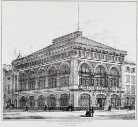
Reviewed in The New York Times, November 19, 1884, Daily Tribune for the show on the 18th; the Times and the Sun for the 19th. See Touring with Cable and Huck
It was on this night that Sam, recalled in his 1906 autobiography, overheard a conversation that would greatly affect his life:
"I had been lecturing in Chickering Hall and was walking homeward. It was a rainy night and but few people were about. In the midst of a black gulf between lamps, two dim figures stepped out of a doorway and moved along in front of me. I heard one of them say, “Do you know General Grant has actually determined to write his memoirs and publish them? He has said so today, in so many words.” That was all I heard—just those words—and I thought it great good luck that I was permitted to overhear them [Kaplan 261]."Mark Twain Day By Day
Thursday, November 20, 1884: Newburgh, New York--Opera House
During those early days of the tour Twain seems to have thought highly of Cable as a performer. Cable was well pleased with himself all along, although he felt that he somehow struck a new and superior "streak" beginning on November 20, before a small audience at Newburgh, New York. (pg21-22 Cardwell)
"A Newburgh audience has had the pleasure of spending an evening with “Mark Twain” and George W. Cable. And enjoyed it to the utmost. The Opera House, where the entertainment was given, was only half filled. This may be accounted for by several reasons: Weather—several other largely attended first class entertainments on preceding evenings this week—the price of reserved seats—another reading in town the same evening—the night on which several church organizations hold weekly service, etc. But the gathering was select and appreciative." Newburgh Daily Journal November 21, 1884 p.2, col 5
An advertisement began in the Youth’s Companion for subscription agents for Huckleberry Finn. The ads ran Nov. 20, 27 and Dec. 11, 1884, and carried the line: AGENTS: “Splendid Terms. Canvassing Books Ready,” together with Charles L. Webster & Co.’s New York address. The canvassing books used by salesmen to pitch sales carried the famous obscene defacement of page 283, since Webster did not detect the obscenity until November 28, 1884, eight full days later. He then informed the New York Tribune and the New York Herald about the defacement [The Twainian, Mar-Apr 1946, p.1-3].Mark Twain Day By Day
Sam called on General Grant at his New York City home on East 66 th Street to offer to publish Grant’s memoirs. When he left, “he was convinced that the general would give Charles L. Webster & Co. the rights to publish his memoirs” [Perry 115]. Grant discussed Sam’s offer with his children and Adam Badeau, then wrote to close friend and advisor George W. Childs to help him evaluate the situation [116].Mark Twain Day By Day
Friday, November 21, 1884: Philadelphia, Pennsylvania --Association Hall
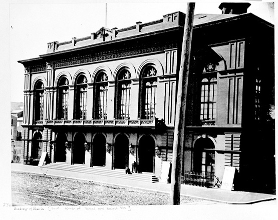
"Major J.B. Pond has brought before the public for three readings in this city the names Mark Twain and George W. Cable, and they have proved a powerful attraction among the most cultivated and intelligent people of this city. The first reading was given last night at Association Hall, where a very select audience assembled, filling three circles of the pretty auditorium." From The Philadelphia Inquirer 1884: November 22Touring with Cable and Huck
Sam wrote from Philadelphia to Livy:
“Livy darling, a most noble big audience, & a most prodigious good time. We are to be here again Wednesday afternoon & evening, 26 th —the day before thanksgiving. I must straight to bed, for we rise at 6 in the morning, & talk twice in Brooklyn tomorrow” [MTP].Mark Twain Day By Day
George Cable wrote on the back of his Philadelphia program to his wife, Lucy:
“Mark is on the platform, there goes a roar of applause! We have a superb audience—both in numbers & quality—& we are beating ourselves. Mark says as he passes me on the retiring room steps 'Old boy, you're doing nobly’ ” [Turner, MT & GWC 60].Mark Twain Day By Day
Saturday, November 22, 1884: Brooklyn, New York--Academy of Music
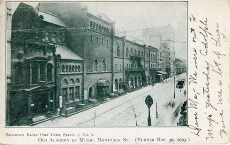
Sam and Cable left Philadelphia and traveled to Brooklyn, where they gave two performances at the Academy of Music. The Brooklyn Eagle called it “The Literary Event of the Season” [p.5]. Henry Ward Beecher and Dean Sage and wife were in the audience. A Miss Copelin from St. Louis sent Sam a note and he went to see her. She was the daughter of a young girl he once knew. Miss Copelin was 21 and her mother was only fifteen when Sam knew her. “It made things seem a long time ago, & also made me feel very old & useless” [Nov. 23 to Clara Clemens, MTP].Mark Twain Day By Day
2 Shows. Huge houses.
"...and I will read instead a scene from my new play, in which Colonel Mulberry Sellers having failed in everything else tackles science as a last resort, and proposes to utilize the wasted energies of the present race of human beings in rehabilitating those who had gone over to the majority. His friend Lafayette Hawkins, of Missouri, thinks that there is no money in it, but the colonel takes policemen and shows that model and best of all immortal patrolmen can be furnished at nine cents apiece, and an exceptionally good article at $120 a gross. A permanent set of dead Congressmen was suggested, and it was said that Europe could be furnished with kings who could actually eat dynamite. Charlemagne and Solomon could be sold at auction, and the dead heroes of Greece and Rome would be worth millions. "We will make a good sale," the colonel continued, "but I must insist on no higgling about a million or two either way." The Brooklyn Daily Eagle 1884: November 23
Sunday, November 23, 1884:
Monday, November 24, 1884: Washington, D.C.--Congregational Church
"As for "Mark Twain," Father Time has no mercy even upon a professional mirth-provoker and has plentifully sifted his hair and heavy drooping moustache with fine white powder. His face is as clean cut as cameo. He speaks in a sort of mechanical drawl and with a most bored expression of countenance. The aggrieved way in which he gazes with tilted chin over the convulsed faces of his audience, as much as to say, "Why are you laughing?" is irresistible in the extreme. He jerks out a sentence or two and follows it with a silence that is more suggestive than words. His face is immoveable while his hearers laugh, and as he waits for the merriment to subside, his right hand plays with his chin and his left finds its way to the pocket of his pants. Occasionally the corners of his mouth twitch with inward fun, but never is a desire to laugh allowed to get the better of him. These characteristics agree so well with his description of himself in his books -- Innocence victimized by the world, flesh, and Devil -- that one cannot fail to establish the resemblance and laugh at the grotesque image." Washington Post 1884: November 25, courtesy Touring with Cable and Huck
Afterward Cable wrote to his wife Lucy:
A crowded house that went off like gunpowder the moment it was touched; a delicious audience. The brightest, quickest, most responsive that we have yet stood before....When I arrived in town the local manager told me he had between 12 and 15 requests for me to sing Zizi. The audience encored it; but I gave them “Mary’s Night Ride” & then they encored that, & I sang Aurore. How I love to read the Night Ride; but it is a good half-day’s work crowded into seven minutes... [Turner, MT & GWC 61].Mark Twain Day By Day
Sam wrote from Washington, D.C. to Livy:
Splendid times, Livy dear! A Congregational church packed with people—$750 in the house. The most responsive audience you ever saw. We did make them shout, from the first word to the last. I say “we,” for the honors were exactly equal—as they pretty much always are, now. I worked the ghost story right, this time, & made them jump out of their skins.Mark Twain Day By Day
Tuesday, November 25, 1884: Washington, D.C.--Congregational Church
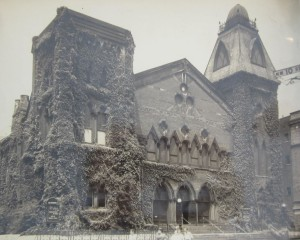
On Tuesday night when Cable walked off after his second number he found three congratulatory visitors in the retiring room-President Chester A. Arthur, a daughter of Frederick T. Frelinghuysen, Arthur's Secretary of State, and "another lady" whose name Cable missed. A little later Frederick Douglass came in. Cable wrote ecstatically to his wife: “They met as acquaintances. Think of it! A runaway slave!” (pg 22 Cardwell)
Note: Nowhere in Huck Finn does Sam refer to Jim as “Nigger Jim.” When did this label start? Ernest Hemingway is often blamed for this, but the above review [Washington Post Nov. 25, 1884] shows, even before Huck Finn was published in the U.S., that some referred to Jim as “Nigger Jim.”Mark Twain Day By Day
Wednesday, November 26, 1884: Philadelphia, Pennsylvania --Association Hall

Sam and Cable left Washington for Philadelphia, where they gave a reading in Association Hall.
“...this same performance in Philadelphia could have been the one that was followed, as Cable remembered it, by Twain's rueful groaning, 'Oh, Cable, I am demeaning myself. I am allowing myself to be a mere buffoon. It's ghastly. I can't endure it any longer.' That night and the next day, according to Cable, Twain devoted himself to the study and rehearsal of selections which he deemed justified both as humor and as 'literature and art'”. (pg25 Cardwell)
"One of his yarns contemplated the reform of the human race by preventing the habit of profanity among men. The reform was to be accomplished by substituting mechanical swearing through the means of the phonograph. The effect of this contrivance on shipboard, colored by all the possibilities of swearing in foreign languages, and swearing backwards and multiplying the force of it by placing as many as one hundred and fifty phonographs in different parts of the ship was too much for the most serious audience in the world, and there was a continuous burst of laughter." The Philadelphia Inquirer 1884: November 27 Touring with Cable and Huck
Thursday, November 27, 1884: Morristown, New Jersey--Lyceum-Library
They spoke at the Lyceum - Library
Livy’s 39 th birthday.
Once again, Sam was away from home on a family member’s birthday.Mark Twain Day By Day
In the evening, they gave a reading in Morristown, New Jersey and spent the night at the home of Thomas Nast, just before Nast began his own tour. The cartoonist arranged for them a quiet supper...Oysters on the shell were served at the little repast, and Mr. Clemens expressed his delight at the quality thereof and at Nast’s urging ate five plates full, after which he asked for an apple. Sam and George were to leave early the next morning, and Mrs. Nast agreed to see that they were up in time. When she woke she found the men still asleep and every clock in the house stopped. Sam said , “Wal, those clocks are all overworked, anyway. They will feel much better for a night’s rest” [Paine, Nast 511-12].Mark Twain Day By Day
Friday, November 28, 1884: Baltimore, Maryland. --Academy of Music
Sam and George W. Cable left the Nast home in Morristown, New Jersey.
Saturday, November 29, 1884: Baltimore, Maryland. --Academy of Music
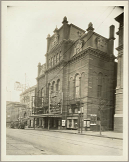 Sam submitted to an “interview” by the Baltimore American. (See Fatout, Mark Twain Speaks for Himself, p137.)Mark Twain Day By Day
Sam submitted to an “interview” by the Baltimore American. (See Fatout, Mark Twain Speaks for Himself, p137.)Mark Twain Day By Day
"He [Mark Twain], too, wore the conventional swallow tail. He came forward with a lazy air. It was as much as he seemed able to do to drag one foot after another. His dark, iron-grey hair was brushed back. He has a heavy brownish moustache. As he walks he stoops slightly. He never smiles. When he says anything that creates laughter, he simply pauses, throws his head a little on one side and peers sleepily out of the corner of his eye." The (Baltimore) Morning Herald 1884: November 29 Touring with Cable and Huck
Sunday, November 30, 1884:
Sam and Cable dined with Daniel Coit Gilman (1831-1908), first president of Johns Hopkins University [Turner, MT & GWC 63].
"This was a travel day for the “Twins of Genius,” as they went from Baltimore to Adams, Mass. Sam may have gone home to Hartford briefly, as he took a ride north with Livy and the children the next day to Simsbury, Conn., where George W. Cable then resided." [Cable would not have traveled on this day] Mark Twain Day By Day
Monday,December 1, 1884: Adams, Massachusetts--Town Hall
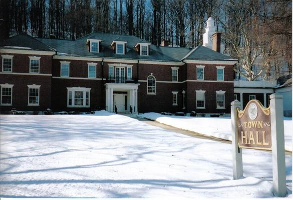 The Clemens family drove north a few hours to Simsbury, Conn., where Cable resided. Sam and Cable may have caught a conveyance there to Adams, Mass., on the western side of the state. Sam wrote at 6:30 PM from Adams, Mass. to Livy, that he’d enjoyed the few hours ride to Simsbury with her and the children. His hoarseness had disappeared, he hadn’t had a nap and hoped Livy could cheer her mother up about Charles Langdon, who was in poor health [MTP]. Mark Twain Day By Day
The Clemens family drove north a few hours to Simsbury, Conn., where Cable resided. Sam and Cable may have caught a conveyance there to Adams, Mass., on the western side of the state. Sam wrote at 6:30 PM from Adams, Mass. to Livy, that he’d enjoyed the few hours ride to Simsbury with her and the children. His hoarseness had disappeared, he hadn’t had a nap and hoped Livy could cheer her mother up about Charles Langdon, who was in poor health [MTP]. Mark Twain Day By Day
Tuesday, December 2, 1884: Troy, New York--Music Hall
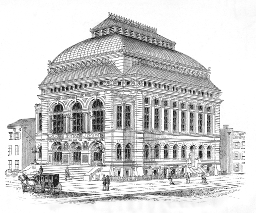 Sam and Cable arrived at Albany, New York at noon. Governor and President-elect Cleveland requested an audience. Writing to Livy the next day about the meeting: ...we had a quite jolly & pleasant brief chat with the President-elect. He remembered me easily, have seen me often in Buffalo, but I didn’t remember him, of course, & I didn’t say I did. He had to meet the electors at a banquet in the evening, & expressed great regret that that must debar him from coming to the lecture; so I said if he would take my place on the platform I would run the banquet for him; but he said that that would only be a one-sided affair, because the lecture audience would be so disappointed. Then I sat down on four electrical bells at once (as the cats used to do at the farm,) & summoned four pages whom nobody had any use for [Note: See MTA 2: 165-6 for another account]. Mark Twain Day By Day
Sam and Cable arrived at Albany, New York at noon. Governor and President-elect Cleveland requested an audience. Writing to Livy the next day about the meeting: ...we had a quite jolly & pleasant brief chat with the President-elect. He remembered me easily, have seen me often in Buffalo, but I didn’t remember him, of course, & I didn’t say I did. He had to meet the electors at a banquet in the evening, & expressed great regret that that must debar him from coming to the lecture; so I said if he would take my place on the platform I would run the banquet for him; but he said that that would only be a one-sided affair, because the lecture audience would be so disappointed. Then I sat down on four electrical bells at once (as the cats used to do at the farm,) & summoned four pages whom nobody had any use for [Note: See MTA 2: 165-6 for another account]. Mark Twain Day By Day
We were all over the Capitol, which is a palace, & got acquainted with a lot of the State officers; then to the Senate chamber & saw the beginning of the solemn ceremony of the casting of the electoral vote of the State of New York for President of the U.S. [MTP].Mark Twain Day By Day
Later, Sam and Cable gave a reading to “an enormous audience” in Music Hall, Troy, New York.
December 2nd they visited Grover Cleveland's office in Albany. “Cable, impressed with the moral strength that he saw in Cleveland's face, came away convinced that the stories of his immoralities were slanders.”. Cardwell mentions that Twain sat on buzzers on Cleveland's desk and summoned four pages. (pg 25 Cardwell)
"Mark Twain, though laboring under a severe cold, managed to make himself heard by the large audience, which showed a disposition to laugh whether he spoke or was silent. There was nothing remarkably witty in his remarks, but his manner and the humorous expression of his mouth and eyes would create laughter if he should read an act of congress to an audience." The Troy (New York) Daily Times 1884: December 3 Touring with Cable and Huck
Wednesday, December 3, 1884: Ithaca, New York--Wilgus Opera House
 George W. Cable wrote en route between Albany and Ithaca to his wife, Lucy:
George W. Cable wrote en route between Albany and Ithaca to his wife, Lucy:
"We had 1400 hearers at Troy. Mark was half sick with a cold—hoarse and weak-voiced, and compared with Balt/o & Wash/n the evening’s success was feeble; but the audience thought it was great. Mary’s Night Ride had to go without an encore at last. But it wasn’t my fault and it was the hit of the evening. The Ghost Story (Mark’s) fell almost flat by reason of persons (2 or 3) rising in the audience just at the critical moment. It was outrageous & I don’t wonder M.T. came off the platform angry. . . . We were given a nice little supper & got to bed at the neat hour of two o’clock, with Mark at peace under the influence of our solemn pledge to each other henceforth to stop our reading and poke unmerciful fun at any one who dares to rise in the audience while we are speaking. It is our only defense against this double imposition on the audience and us [Turner, MT & GWC 64-5]."Mark Twain Day By Day
Thursday, December 4, 1884: Syracuse, New York--Grand Opera House
Sam wrote from Syracuse, New York to Thomas Nast, thanking him for the Nast family’s recent hospitality in Morristown, N.J.
“...do all your praying now, for a time is coming when you will have to go railroading & platforming, & then you will find you cannot pray any more because you will have only just time to swear enough” [MTP].Mark Twain Day By Day
Cardwell states that they were in Muskegon, MI on December 4. (pg26 Cardwell) and Touring with Cable and Huck
At this point in Cardwell's commentary he remarks on Twain's mixed feelings about the lecture circuit. “...usually enjoyed himself when he was actually on the platform before an appreciative audience”. “..he chafed when away from his family, [but] he was chronically restless”. “Twain particularly disliked the ennui of traveling alone. Pond offered companionship, of a sort; and Cable was expected to supply a more intellectual stimulous.” “Unfortunately, he was not in other ways exactly the kind of good company that Twain preferred. He did not drink, he did not tell bawdy stories, he did not play billiards, and he would not travel on Sundays.” (pg 26 Cardwell)
The Syracuse Standard, Friday Morning, December 5, 1884
At the Opera House
An Innocent and His Partner.
"Samuel H. Clemens [sic] (Mark Twain) and George W. Cable, who appeared at the Grand last evening in readings, proved themselves a combination fully equal to entertaining an audience, each in his own particular way. While Mark Twain has a wonderfully happy way of telling his unequalled [sic] humorous stories, Mr. Cable throws into his readings a versatility of talent which is necessarily pleasing. He displays an excellent command of five different and difficult dialects and coupled with this sings with a musical voice many of the Creole songs the words of which mark his popular novels. They were intently listened to by a large and appreciative audience."
Friday, December 5, 1884: Utica, New York--Opera House
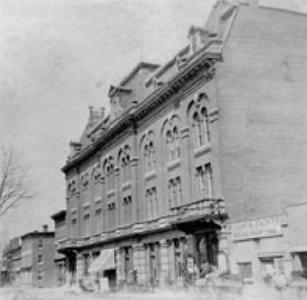 Not mention on Touring with Cable and Huck
Not mention on Touring with Cable and Huck
Saturday, December 6, 1884: Rochester, New York--Academy of Music
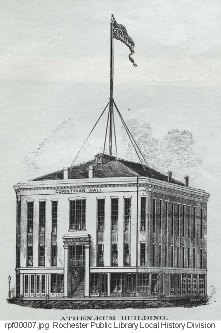 Sam and Cable rose at 4:30 A.M . and took the train to Rochester, New York, arriving at 10 A.M . They gave a 2 PM matinee reading in Rochester at the Academy of Music for a small, but “appreciative to a degree” audience, who fought a downpour to hear the two men. The evening performance was to “a large house and great fun.” Cable wrote his wife that neither of them had ever done so well [Turner, MT & GWC 66].Mark Twain Day By Day
Sam and Cable rose at 4:30 A.M . and took the train to Rochester, New York, arriving at 10 A.M . They gave a 2 PM matinee reading in Rochester at the Academy of Music for a small, but “appreciative to a degree” audience, who fought a downpour to hear the two men. The evening performance was to “a large house and great fun.” Cable wrote his wife that neither of them had ever done so well [Turner, MT & GWC 66].Mark Twain Day By Day
"The very unique and happy entertainment afforded by Mark Twain and Mr. Cable in their joint recitations deserves the warmest praise the press can give it. The former's manner and speech on the platform, which are clearly unaffected, admirably supplement the humor of his thought and language. His style is evidently an expression of himself. The gravity of his features while reciting his side-splitting productions, is equal to the apparent sincerity and frankness with which he guyed that interviewer, and even occasionally draws his audience into a trap and then inwardly laughs at them. The most of his hearers Saturday afternoon and evening endured all in the way of laughter to which it was safe for Mr. Clemens to expose them. But they will be ready to take a second dose whenever he can conveniently visit us again." The Rochester Morning Herald 1884: December 8 Touring with Cable and Huck
Cable persuaded Twain to buy a copy of Malory's Morte d' Arthur
Sam wrote two letters from Rochester to Livy. He’d promised to write twice to make up for days when his schedule prevented writing. The first included: “Been railroading since 4 oclock this morning. My hoarseness seems to be entirely gone, at last, & I feel fresh & splendid. But we got to talk here twice, to-day, & so I am going at once to bed & snatch a couple of hours’ sleep. I have acquired the blessed faculty of sleeping in the day time, in spite of clatter & racket.” Sam felt the trip was a “great thing” for his health, but was sorry it was a hardship for Livy. “Curse the matines! I have ordered that this be the last one for the present” [MTP].Mark Twain Day By Day
In the second note, Sam noted that it had rained hard all day and spoke at a matinee performance.
“The houses were good but not crowded, & we made them shout. I wore that coat for the first time—& the last. It will go back to you by express. I shall never wear anything but evening dress again. I will not defer to fashion to the destruction of my comfort” [MTP].Mark Twain Day By Day
Sunday, December 7, 1884: Rochester, New York--Elks Lodge, New Osburn House
Mark Twain and his manager James B. Pond were guests of the Rochester Elks Lodge. According to a report titled "The Elks' Social," in the Rochester Democrat & Chronicle, 8 December 1884, p. 6, "Mark Twain entertained the assemblage for some time by relating some of his personal experiences..." Text recovered by Leslie Myrick.
Cardwell reports that “Twain stayed in bed to rest, read, and write.” (pg 26 Cardwell)
Sam wrote two more letters from Rochester to Livy. In the first note, Sam admitted being homesick on a “sour, bleak, windy day...with trifling flurries of snow.” He’d stayed in bed all day reading and smoking. Except for the weather the houses would have been overflowing. The second note in the afternoon was a P.S. describing a “violent & absurd” performance of his “first sample of the Salvation Army” [MTP].Mark Twain Day By Day
Cable wrote home that the hotel put Sam and him “on different floors, instead of adjoining rooms as usual. I am told the papers say he was to have enjoyed the hospitality of a club, The Elks, this evening” [Turner, MT & GWC 66].Mark Twain Day By Day
Monday,December 8, 1884: Toronto, Canada--Horticultural Gardens Pavilion
Sam and Cable arrived in Toronto, Canada at 4:30 P.M . on the Great Western train from Niagara Falls [Roberts 19]. In Toronto, Rose Publishing Co. applied to Sam to buy the Canadian rights to publish Huck Finn [Dec. 10 to Webster, MTP]. Ozias Pond was not the tour’s manager until after New Year’s day, but came with the pair. They all stated at the Rossin House, Toronto’s first luxury hotel. In the evening Sam and Cable gave a reading in Horticulture Gardens Pavilion, a 2,500 seat hall only six years old. The next day the Toronto papers, The Telegram, The Globe, The World, and The Mail were unanimous in pronouncing the reading a success. Tickets were 50 cents, reserved seats 25 cents extra. [Roberts 21].Mark Twain Day By Day
As he sometimes did, George W. Cable wrote his wife Lucy while waiting for his turn on stage:
"Such a time as we are having! Such roars of British applause. I never heard anything like it out of N. Orleans. .. . We are in a big glass Horticultural Hall with people so far away at the bottom of the audience that their features can hardly be discerned. . . . When I go back upon the platform again (in a moment) I have to sing my 2 or 3 Creole songs. I always shrink from this, the only thing I do shrink from; though it’s always encored" [Turner, MT & GWC 67].Mark Twain Day By Day
Sam wrote at midnight from Toronto to Livy, listing the items he ate for his “hearty breakfast at 9 this morning.” He also ate a large lunch at 1 PM on the “hotel car.” He’d also just finished a late “supper of beefsteak &c.” Sam told of the night’s performance: “To-night a noble hall to talk in, & an audience befitting it. Both of us had a gorgeously good time. I saw ladies swabbing their eyes freely & undisguisedly after Cable’s ‘Night Ride.’ He did it well” [MTP].Mark Twain Day By Day
Tuesday, December 9, 1884: Toronto, Canada--Horticultural Gardens Pavilion
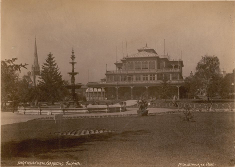 Sam and Cable were driven around Toronto to see the sights, which included the University of Toronto. They visited the studio of painter Andrew Dickson Patterson (1854-1930) famous a year later for his portrait of Canada’s first prime minister, John A. Macdonald (1815-1891).
Sam and Cable were driven around Toronto to see the sights, which included the University of Toronto. They visited the studio of painter Andrew Dickson Patterson (1854-1930) famous a year later for his portrait of Canada’s first prime minister, John A. Macdonald (1815-1891).
Sam wrote from Toronto, Canada to Livy:
"Livy darling, guess who I stumbled on in the hotel car yesterday, with cheery countenance & healthy appetite? Frank Hall the exile. He said he was going to Chicago. We have been all over town, to-day, in the crisp cold air, but I read too long, after going to bed,—read past the sleepy point—& so I have lost my afternoon nap. However, I’m getting a bath ready, & shall go from that to the platform & be all right, no doubt "[MTP].Mark Twain Day By Day
Sam enclosed a short article about the power of a half dozen schoolgirls to brighten up Sphinx-like people on a railroad car. “These be the heavenly bodies in the firmament of our home & life,” Sam wrote across the article.
In the evening, Sam and Cable gave a second Toronto performance in Horticulture Gardens Pavilion. Both Toronto events were sold out [Roberts 22]. The Toronto Globe ran a 2,000-word article on the Dec. 8 performance, including a near verbatim record of Sam’s conversations between Huck and Jim [Cardwell 27-8].Mark Twain Day By Day
"The readings by Mark Twain and George W. Cable, the novelist, which had been looked forward to with such pleasure by Toronto people, were given in the Horticultural Gardens Pavilion last evening. Hardly a seat was left vacant. All the reserved seats were taken before the evening, and people were at the doors soon after seven anxious to be in time to get the best seats that were left. The entertainment was given under the auspices of the Ladies' Aid Society of the Metropolitan Church, which fact must have had something to do with making the audience so large. As might have been expected at such an entertainment, the people there were of the very highest class." Toronto Globe 1884: December 9 Touring with Cable and Huck
Wednesday, December 10, 1884: Buffalo, New York--Concert Hall
The Dawson Brothers in Canada and Chatto & Windus in London published Adventures of Huckleberry Finn [Powers, MT A Life 489; Roberts 22].
Sam needed to satisfy the copyright requirement for Canada by staying in the country until the end of the business day, so he stopped in Fort Erie, while Cable and Pond continued on to Buffalo, New York. Sam later caught up with them there and the pair read in Concert Hall [Roberts 22]. Fatout says Sam had to talk above steam pipes banging [Circuit 212]. “A Ghost Story,” “King Sollermun” and “Personal Episodes” [MTPO].
Sam wrote from Fort Erie, Canada to Charles Webster, notifying him about Rose Publishing Co. wishing to buy Canadian rights to Huck Finn. Sam wanted him to send them an answer, provided they hadn’t pirated P&P [MTP].
Andrew Chatto wrote to Clemens that HF had been published [MTP].
William R. Nichols wrote to ask Clemens his views on amateur journalism [MTP]. Note: Sam wrote on the env., “Impudent puppy. / Not answered” Mark Twain Day By Day
See Touring with Cable and Huck for review.
Thursday, December 11, 1884: Buffalo, New York--Concert Hall
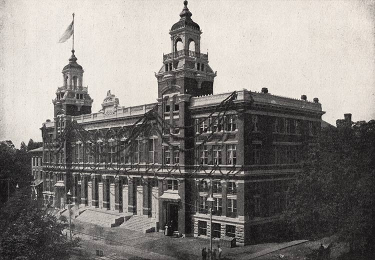 Sam “rushed to David Gray’s...with Cable, arrived at noon” and had to wait for his steak to be re-cooked, and so drank two cups of strong coffee that did not agree with him [Dec. 12 to Livy, MTP].Mark Twain Day By Day
Sam “rushed to David Gray’s...with Cable, arrived at noon” and had to wait for his steak to be re-cooked, and so drank two cups of strong coffee that did not agree with him [Dec. 12 to Livy, MTP].Mark Twain Day By Day
"A very large and fashionable audience assembled in Concert Hall last night to hear that prince of humor, Mark Twain (Samuel M. Clemens), and that celebrated novelist, George W. Cable, in their joint readings. They went expecting a treat and they got decidedly more than they bargained for. A more delighted, amused, thoroughly satisfied audience never filled the auditorium of any building in Buffalo. Mark Twain, like old wine, or old friends, seems to improve with age, and his dry, unconscious, apparently spontaneous humor kept the audience in convulsions of laughter. With the exception of his first reading, given in the program below, most of the great humorist's admirers have heard or read the selections he gave last night, but they are of the kind that never grow "stale, flat or unprofitable" by repetition." The Buffalo Times 1884: December 11 "MARK TWAIN AND CABLE--TWO DISTINGUISHED LITERATEURS AT MUSIC HALL." Touring with Cable and Huck
In the evening he met with the Hartford Club of Buffalo for dinner, but, “...ate not a bite, & spent 2 of the infernalist weariest hatefulest hours that ever fell to my lot” [Dec. 12 to Livy, MTP].Mark Twain Day By Day
Friday, December 12, 1884: Ann Arbor, Michigan--University Hall
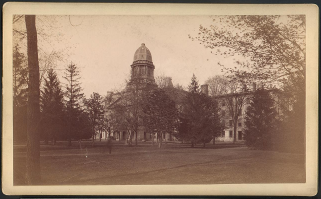 Sam took a train from Buffalo at 12:30 A.M . and arrived at Ann Arbor, Mich. at 10 A.M. Sam wrote from Ann Arbor to Livy:
Sam took a train from Buffalo at 12:30 A.M . and arrived at Ann Arbor, Mich. at 10 A.M. Sam wrote from Ann Arbor to Livy:
"...went straight to bed, declining President Angel’s [Buffalo University] invitation to dinner & meet ex-President Hayes’s wife & others at 6 this evening. It will be a long time before I sample anybody’s hospitality again. I have been asleep two hours, & shall resume it right off. I find no letters here—hope for some before we get away. I love you sweetheart "[MTP].Mark Twain Day By Day
"The students generally, of whom the audience was largely composed, abandoned themselves to the most thunderous laughter every time Twain appeared on the stage; staid members of the University Faculty, who always maintained a twenty degrees below zero countenance in the classroom, laughed till they were out of breath; law professors, wrapped up in ponderous legal volumes, and who have not been known to smile in twenty-one years, fairly rolled off their seats from laughter at every point Twain made. Even a couple of Japanese students, who, although having a fair command of English, could not readily see the incongruities of Twain's remarks, felt in duty bound to join in the general feeling, and undoubtedly did their best, although several times they broke forth in the wrong place to the astonishment of those about them." The Northwestern 12-19-1884, Page 2; Evanston, Illinois
Saturday, December 13, 1884: Grand Rapids, Michigan--Powers' Opera House
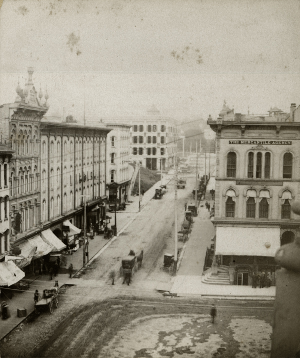 Two copies of Adventures of Huckleberry Finn were deposited in the Copyright Office, Library of Congress, though the official publication did not take place until Feb. 18, 1885 [Hirst, “A Note on the Text” Oxford edition, 1996].
Two copies of Adventures of Huckleberry Finn were deposited in the Copyright Office, Library of Congress, though the official publication did not take place until Feb. 18, 1885 [Hirst, “A Note on the Text” Oxford edition, 1996].
Sam wrote from Grand Rapids, Mich. to Livy, that they’d spent the whole day on the train and would rest in bed an hour before his reading. He was homesick again, and ate chestnuts the children had left in his overcoat pockets. Cable visited a Baptist church where he was called on to talk to the Sunday school [Cardwell 29]. Mark Twain Day By Day
Daily Morning Democrat, December 14, 1884
AMUSEMENTS
The "Mark Twain"-Cable Readings.
"The readings by Messrs. Clemens and Cable at Powers' opera house last evening proved a very pleasant entertainment. Readings usually are rather tedious affairs, and an audience is sure to get wearied long before the close of the programme is reached. In the present instance the time passed away delightfully, and the only regret experienced seemed due to the fact that the "solemnities" of the occasion, as Mark Twain put it, had been brought to a close altogether too soon to suit the pleasure of the very large audience present."
"Of course "Mark Twain" is simply himself, and to be appreciated must be heard. Being a humorist by profession, he looks a good deal like an undertaker during a lull in business; his voice is of a low pitch, the expression of his countenance non-commital, his movements not really graceful, his gait just a trifle shambling. He talks in a matter-of-fact way, has a very pleasant smile which lingers with apparent fondness 'neath the cover of a heavy moustache, seems not at all distressed by his own jokes, and goes at his work evidently aware of the fact that "business is business," and must be looked after. Mr. Cable is of a dark complexion, slight in figure, rather high-pitched voice, somewhat given to gesticulating freely while reading, and thoroughly in earnest while at work."
Sam and Cable gave a reading in Grand Rapids, Mich. Afterward the two went to Professor and Mrs. Rogers’ reception given to Mrs. Rutherford Hayes (Lucy Ware Hayes), wife of the ex-President. Cable wrote she was “a fine looking woman.” Cable reported they... “...got away very early & went to the tavern & to supper. A deputation of students waited to see us in the parlor. Rec’d them standing and after some pleasant exchanges parted from them & went to bed...” [Turner, MT & GWC 70].
Charles Webster wrote to Clemens: “We brought out the book all right and the copyright on Huck Finn is perfect” Good sales were coming in from agents, though the depression hampered [MTP].Mark Twain Day By Day
Sunday, December 14, 1884:
Mark Twain Day by Day reports that Twain and Cable gave a reading in Muskegon, MI on this date, but that is not likely as Cable would not have agreed to a reading on a Sunday.
On Sunday, December 14, Cardwell says that Twain probably stayed in bed but Cable “ visited a large Baptist church and was recognized and was asked to speak to the Sunday school. He wrote his wife: “This hasn't been one of my best Sundays. I do not feel the spiritual refreshment I want. But the next one, God willing, will be spent with you in our quiet valley home among out five darlings and our gentle, quite friends.” (pg29 Cardwell)
Cardwell hints that perhaps Twain's company is beginning to wear.
They may have stayed at the Russell House
Sam also wrote short notes in German from the Morton House in Grand Rapids, Mich. to each of his daughters, Clara, Jean, and Susy. He also wrote to Livy, happy that the “thundering hard week” would end at home.
"Livy dear, I have just written three German letters to the children, & now I will give the fag-end of my time before train-departure to a word with Mamma. By George these are terrific days of travel!—eight, ten, twelve hours in the cars every day or night, & a talk on the platform at the end. Toledo & Detroit have been interchanged; consequently I leave here at 6 p.m. to-day, reach Jackson toward 10; leave there half past 5 a.m., & get to Toledo during the forenoon. Cable would land in — — - - - - - - in a minute if he were to go a mile on Sunday; consequently he leaves here at 5 to-morrow morning, & is on the road the entire day till night"[MTP].Mark Twain Day By Day
Sam also wrote a two-line note to Charles Webster, asking him to get the Globe edition of Thomas Malory’s “Le Morte D’Arthur” and leave it with James B. Pond for his brother, Ozias W. Pond [MTP].Mark Twain Day By Day
Monday,December 15, 1884: Toledo, Ohio--Wheeler's
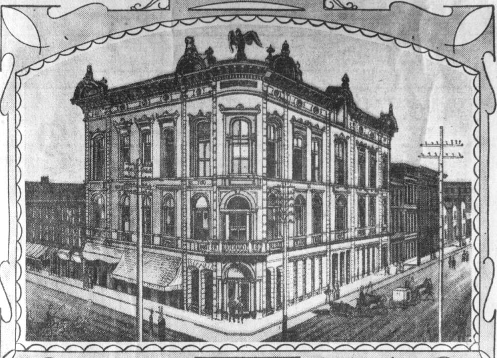 Sam wrote two letters from Toledo, Ohio to Livy. After remarking on the “prettiest furniture” of the hotel the night before in Jackson, Mich., Sam told of his day: “We got up at 5 & took the train. All the way, in the cars, was a mother with her first child—the proudest & silliest fool I have struck this year. She beat the new brides that one sees on the trains” [MTP].
Sam wrote two letters from Toledo, Ohio to Livy. After remarking on the “prettiest furniture” of the hotel the night before in Jackson, Mich., Sam told of his day: “We got up at 5 & took the train. All the way, in the cars, was a mother with her first child—the proudest & silliest fool I have struck this year. She beat the new brides that one sees on the trains” [MTP].
In his second letter, Sam asked his wife not to make any appointments for him outside the home during the holiday break. Sam wanted to improve his program for second nights in the same city. Livy had made reading choices for him and he wanted to “go to work on them the minute” he got home, and “make another hunt through the books” with her [MTP].
Sam also wrote to Charles Webster, asking how the bedclothes invention happened to tear? How in the nation can the thing tear, when it has got a couple of coverlets in its grip, & when the elastics give, & won’t let it tear? You want to experiment more carefully.Mark Twain Day By Day
"Twain and Cable, -- The audience that greeted these unique entertainers was not large, but it was an intelligent and discriminating one. Mr. Clemen's droll humor delivered in the funniest manner kept the audience in a constant giggle, and Mr. Cable's masterly delivery of striking extracts from his novel, "Dr. Sevier" held the hearers attention and carried them through the scenes of the imaginary recital. Mark Twain is a prime funny man and he is just as funny on the stage, in words, tones, gestures and attitudes, as he is in his books, and Mr. Cable is sure of being rated as an artiste in elocution as well as a fascinating novelist. The entertainment was undoubtedly greatly enjoyed by the people present, who were only sorry that it was not longer." Toledo Blade December 16, 1884
Sam and Cable gave a reading in Opera House, Toledo, Ohio. During his turn off stage, George Cable wrote his wife Lucy:
"Our experience with such [apathetic] houses is that I lift them a little with my first number, then [MT] lifts them from that stage a little higher, then with my 2/d number I lift them to a third elevation & with his 2/d no. (being the 4 th ) he gets them into a good strong glow. I am happy to see it is working just so now, after all. If he can get an encore from them on this we shall have them to the end without any trouble. There! Mark gets the call back twice over. Now we’re all right. It will be encores right through to the end"[Turner, MT & GWC 72-3].Mark Twain Day By Day
Tuesday, December 16, 1884: Detroit, Michigan--Whitney's
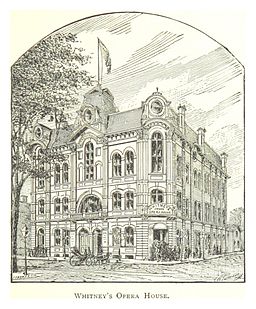 THE AWKWARD HUMORIST.
THE AWKWARD HUMORIST.
" When Mark Twain entered to give the advance sheets from "Huckleberry Finn," his gait resembled the motion of a tall boy on short stilts and he made his way around the table and approached the footlights. He was dressed in the conventional black suit, which is totally unsuited to the infinitely droll looking character enclosed within it. An extraordinary head of stiff hair of no particular color, but inclining to a bleached brick-dust shade, and which appeared to be perfectly independent of the large-sized cranium over which it hovered, had evidently been gone over a few times with a harrow to make the stubborn crop of hirsute delirium tremens stay down for a hour or two. And then the face was Yorick come again without a touch of paint but with the added drollery of generations of jesters. The low, square, wrinkled forehead, the face knotted with bumps of living fun, the short cropped military looking moustache, the eyes half closed and wearing an expression of doubt, as though their owner were balancing in his mind whether upon the whole he had better deliver the lecture or go to bed, made up one of the oddest looking faces ever worn by man."
HOW HE ACTS AND SPEAKS.
"As for his complexion, it is doubtful whether any person present will ever remember what it was and it is possible he does not know himself. At some time in his life it was probably sandy, but his efforts in the way of eradicating the freckles, which report says once covered it, may have changed it to the neutral tint it now presents. His arms are somewhat short for his ample length and these are apparently as unmanageable for him as his hair. They are sometimes swung in front of his person and then left to dangle around at his sides--like a pair of government arms. Again one of them is spasmodically jerked to his forehead and the other follows about half way, giving the observer the impression that it is out of his power to move one without moving the other. Then the hands appear at times to move without an effort of his will and crawl into his pockets, from whence they are summarily pulled when it comes to the knowledge of the proprietor. His legs are tolerably well under control, but even those members of the animated joke at times show plainly that they are restive under restraint and would gladly return to the old days when their owner gave them a larger allowance of liberty. Twain finds his voice after a short search for it and when he impels it forward it is a good, strong, steady voice in harness until the driver becomes absent-minded, when it stops to rest, and then the gad must be used to drive it on again. Mr. Twain has a swan-like neck which his trick of throwing up his chin shows to advantage. It is as long as his shirt bosom and as white; but it is much thicker than a swan's."
" He is not completely successful and making a bow, and he trots off the stage seemingly delighted at the prospect of being so much nearer to the end of the entertainment."
The Detroit Post 1884: December 17 courtesy Touring with Cable and Huck
Wednesday, December 17, 1884: Cleveland, Ohio --Case Hall
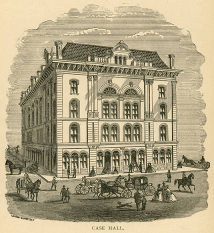 "Mark Twain is his companion's opposite in every particular. The latter is small and graceful, Twain tall and awkward. His gestures are few and meaningless, and he does not smile when uttering jokes that almost put his audience in convulsions. His great head of hair, once glossy black, is now an iron gray, and his bushy mustache jutting out over his queer mouth is also streaked with white. While his audience was roaring with laughter he simply pulled his mustache and scowled. Sentences and phrases that, emanating from other lips, would seem dull and commonplace, prove paroxysms of mirth when uttered by him. As a reader he is far outside of any conventional rule, but coming from his own lips his lines gather and convey many new and charming meanings. The laughter that greeted his first appearance attended him to the last. Despite his peculiar drawl and awkward gestures, his audience left satisfied of having been entertained by a geniune and wholesome wit rather than by any harlequinade of language. He began his part of the programme by relating an incident that occurred when he lectured in that same hall thirteen or fourteen years ago, when he forgot a passage in his speech and called on the audience to help him out. They thought that he was joking and he repeated the request. This only augmented the fun. Finally a gentleman arose and said that if he was really in earnest he would remind him what lie he was telling when the interruption occurred. "That gentleman," said Mr. Twain, "was Mr. Solomon Severance, and I have been very grateful to him ever since." His first selection was from the advance sheets of a new story called the "Adventures of Huckleberry Finn," and was his best effort of the evening. His few years' retirement from the stage has robbed him of none of his mirth-provoking abilities, and the great audience laughed until it was weary, then rested, and laughed again." The Cleveland Leader 1884: December 18, courtesy Touring with Cable and Huck
"Mark Twain is his companion's opposite in every particular. The latter is small and graceful, Twain tall and awkward. His gestures are few and meaningless, and he does not smile when uttering jokes that almost put his audience in convulsions. His great head of hair, once glossy black, is now an iron gray, and his bushy mustache jutting out over his queer mouth is also streaked with white. While his audience was roaring with laughter he simply pulled his mustache and scowled. Sentences and phrases that, emanating from other lips, would seem dull and commonplace, prove paroxysms of mirth when uttered by him. As a reader he is far outside of any conventional rule, but coming from his own lips his lines gather and convey many new and charming meanings. The laughter that greeted his first appearance attended him to the last. Despite his peculiar drawl and awkward gestures, his audience left satisfied of having been entertained by a geniune and wholesome wit rather than by any harlequinade of language. He began his part of the programme by relating an incident that occurred when he lectured in that same hall thirteen or fourteen years ago, when he forgot a passage in his speech and called on the audience to help him out. They thought that he was joking and he repeated the request. This only augmented the fun. Finally a gentleman arose and said that if he was really in earnest he would remind him what lie he was telling when the interruption occurred. "That gentleman," said Mr. Twain, "was Mr. Solomon Severance, and I have been very grateful to him ever since." His first selection was from the advance sheets of a new story called the "Adventures of Huckleberry Finn," and was his best effort of the evening. His few years' retirement from the stage has robbed him of none of his mirth-provoking abilities, and the great audience laughed until it was weary, then rested, and laughed again." The Cleveland Leader 1884: December 18, courtesy Touring with Cable and Huck
Thursday, December 18, 1884: -- Sunday, December 28, 1884:
Sam and Cable took a Christmas break, this day being a travel day. Sam headed for New York where he spent the night at the Everett House, where he’d asked Webster to call on the morning of Dec. 19 [Dec. 15 to Webster, MTP]. Cable headed to his home in Simsbury, Conn., but stopped in New York where he appeared alone on Dec. 19 at the Y.M.C.A. [Cardwell 31; Turner, MT & GWC 75]. December 19 Friday – Sam, after meeting with Charles Webster, probably headed straight home for Hartford, although no documentation for this date has been found.Mark Twain Day By Day
Sam wrote to James B. Pond December 22. Evidently, newspaper reviews aside, Sam was growing tired of Cable, and had concluded he’d do better without him. You were right, when you said in the Brunswick hotel last summer that I would draw better all by myself. It is true. I thought Cable would be a novelty, but alas he has been everywhere, & is a novelty nowhere. I wish I could pay him $200 a week to withdraw, & pay the little Russian musician a reasonable sum to take his place. I would do it in a minute. Personally I like Cable immensely; & in his right place he ought to be a good card—but he is not in his right place now.
Sam felt that Cable drew only a “sixteenth part of the house, & he invariably does two-thirds of the reading. I cannot stand that any longer. He may have 35 or 38 minutes on the platform, & no more.” Sam wanted Cable to cut his selections because overall he felt the show was too long. He also felt Cleveland and Detroit were “well worked & advertised” [MTP].Mark Twain Day By Day
December 28 Sunday – Sam took the train from New York in the morning and traveled all day. He wrote at 9:30 P.M from Pittsburgh to Livy. Cable had arrived on Dec. 27. Sam asked that a letter he’d left at Hartford from a “Chicago poetess” be sent on to him. He told of an attempt by the railroad to “curtail his liberties” after breaking some rule (possibly smoking). After tangling with the head conductor, who got civil at some point, Sam insisted the man report him, because he was going to “drag it [the rule] in the dirt all day.”
"Of course he couldn’t do anything, so he had to leave me alone—to the joy of all the passengers. They said they had often seen the rule applied, but had never seen it resisted before. I wonder if we shall have any liberties left, by & by, if we keep up our American habit of meekly submitting to every imposition that is put upon us [MTP].Mark Twain Day By Day
Monday,December 29, 1884: Pittsburgh, Pennsylvania --Cumberland Presbyterian Church
Pittsburgh did not like the show, at least not the reviewers:
"S.L. Clemens, better known as "Mark Twain," and Mr. George W. Cable recited selections from their own writings last night at the Cumberland Presbyterian church. The congregation was large, and there was an air of intellectuality about the people that betokened keen appreciation and accurate comprehension. One thing was noticeable among the listeners: Nearly everyone had a long nose. If those who were there will glance at each other's companion, this exceptional gathering of long and well-shaped noses will be easily discerned. The occasion was supposed to be a humorous one. Long noses indicate serious intelligence. It may be because the entertainment was a church performance, the true character of it was not suspected."
The Pittsburg Dispatch 1884: December 30 Touring with Cable and Huck
Clemens included “Tragic Tale of the Fishwife,” and “Infestation of Phelps’ cabin with snakes and rats” [MTPO].
Later, Sam wrote from Pittsburgh to Livy. Besides adding that he’d “Heard a wonderful banjo-player to-day,” named “Cable—but no kin,” [Dec. 30 to Livy] he wrote of the performance:
"Well, mamma, dear, the child is born. To-night I read the new piece—the piece which Clara Spaulding’s impassibility dashed & destroyed months ago—& it’s the biggest card I’ve got in my whole repertoire. I always thought so; It went a-booming; & Cable’s praises are not merely loud, they are boisterous. Says its literary quality is high & fine—& great; its truth to boy nature unchallengeable; its humor constant & delightful....It took me 45 minutes to recite it (didn’t use any notes) & it hadn’t a doubtful place in it, or a silent spot" [MTP].Mark Twain Day By Day
Tuesday, December 30, 1884: Dayton, Ohio--Grand Opera House
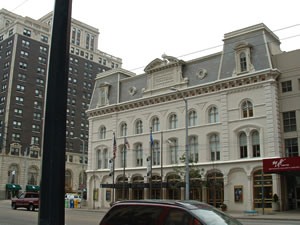 Sam and Cable rode the train all day and gave a reading in Grand Opera House, Dayton, Ohio. Afterward, Sam wrote from Dayton, Ohio to Livy:
Sam and Cable rode the train all day and gave a reading in Grand Opera House, Dayton, Ohio. Afterward, Sam wrote from Dayton, Ohio to Livy:
“Livy darling, we got up at 7 this morning & traveled all day, arriving here an hour after dark. I did not feel tired, & do not feel tired now, though I nearly always do feel tired after a reading. However, I suppose I am tired, even if I don’t feel so.”
Sam told again of the wonderful banjo player they’d heard the day before, how George Cable accompanied the banjo-playing Cable (of no kin) on the guitar.
Sometimes it seemed to me it was almost the most inspiring music I ever heard; & his Way Down upon the Swanee River, with soft, fine variations was singularly tender & beautiful. He is self-made, self-taught. I liked his “Golden Slippers” —in fact I enjoyed everything he played, & he must have played forty & fifty pieces in our rooms [MTP].Mark Twain Day By Day
MARK TWAIN AND GEORGE W. CABLE--GRAND OPERA HOUSE.--It is probably a debatable question whether or not it is well for a lecturer to be preceded by a reputation for humor. People may go to hear, expecting to be convulsed with every sentence, and at the close of the performance, finding every vest button in place, think they have been disappointed. Upon the other hand, it is a comfort to the lecturer to know that his audience is on the lookout for his good things, and none of them are likely to escape a manifest approval. Laughter comes easy to an audience of Twain's, and having once started to laugh people are kept in a titter for the remainder of the evening. His fun is of the "dry" variety, not appreciated by the lover of the broad jokes and antics of the circus or minstrel show. In appearance he resembles the Nast caricatures of Whitelaw Reid, tall, gaunt, with long neck, heavy moustache and lots of hair. He wears a dress suit, but it is awfully wrinkled, and Mark looks as uneasy in it as a young man from the country. While speaking he holds up his right arm with his left hand, fingering his chin with his right hand in a nonchalant manner. He drawls his words, keeps a sober face, with rather an anxious, earnest look, and tumbles along into his story in a hesitating sort of way, very well imitating the characters supposed to be in conversation, and fetching a laugh about four times a minute. The best thing was his selection from his unpublished book--Huckleberry Finn, a companion to Tom Sawyer. He is droll and no mistake, but his trot off the stage every time seems affected." The Dayton Daily Journal 1884: December 31, Courtesy of Touring with Cable and Huck
Wednesday, December 31, 1884: Hamilton, Ohio--
Cardwell notes that they were in Paris, KY on December 31. (pg 31 Cardwell) as does Touring with Cable and Huck
From the Hamilton Telegraph December 18, 1884
"--Mark Twain, the humorist, and Geo. W. Cable, the eminent novelist, will appear in Hamilton on New Year's eve, in readings, under the management of J.B. Pond, of Boston"
Courtesy Valerie Eliot, Lane Public Library
Thursday, January 1, 1885: Paris, Kentucky--Court House
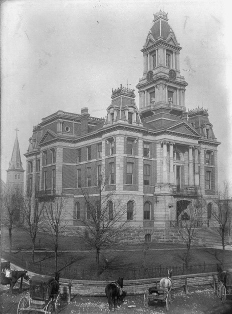 Sam took a train to Cincinnati, Ohio for the day, then to Paris, Kentucky for the show.
Sam took a train to Cincinnati, Ohio for the day, then to Paris, Kentucky for the show.
Under the management of Ozias Pond, brother of James B. Pond:
"The Twain-Cable entertainment at the Court House on New Year's night was not in the nature of lectures, but consisted chiefly of recitations. Interspersed with these were anecdotes, Creole songs, incidents of travel, and personal experiences under circumstances of embarrassment, the most perplexing, ludicrous, and convulsively amusing. Humor, at once genuine and refined, is a rare gift. It is better than physic. It dispels gloom, sheds sunshine into the care-worn heart, and like a touch of kindness, "makes the whole world kin."
"The house was handsomely filled, and we never saw a more highly amused, or better pleased audience."
"Mark Twain in appearance is a sort of living and moving anecdote. In manner, quaint, easy and unctious; his voice, deep bass and drawling, like an old fashioned country preacher, wearing a benevolent, but solemn countenance, he creates the impression that he would make sinners howl if he got after them in evangelistic style."
"Cable is somewhat younger in appearance; is spruce and polished, a fine reader and delineator of character, and a good actor with splendid voice in song. He would be classed by Zack Chandler as one of "them litterary fellers."
"Each, is accomplished in his part, and to be appreciated must be seen."
"We commend to the stammering fraternity a complete cure, as illustrated by Mark Twain."
The (Paris) Kentuckian 1885: January 3 coutesey Touring with Cable and Huck
George Cable wrote to his wife, Lucy,
We have just finished a delightful evening on the platform before a hearty, quick-witted audience that laughed to tears and groans at Mark's fun & took my more delicate points before I could fairly reach them. I have a little bunch of flowers given me by a young lady of the Clay family. Many persons crowded round us after the entertainment. All this was particularly pleasing to me inasmuch as this is a Southern town & the two feelings which I always have to encounter in Southern towns were present & evident here. A ball was given in opposition [Turner, MT & GWC 78].Mark Twain Day By Day
Sam wrote to Livy: Livy darling, we have had a most pleasant evening here—in a region familiar to Ma when she was a girl, some seventy or eighty years ago. Wherever we strike a Southern audience they laugh themselves all to pieces. They catch a point before you can get it out—& then, if you are not a muggings, you don’t get it out; you leave it unsaid. It is a great delight to talk to such folks.
Sam related a conversation he heard on the smoking-car, writing in dialect about a farmer turned educator [MTP].Mark Twain Day By Day
Friday, January 2, 1885: Cincinnati, Ohio --Odeon Hall
Sam wrote from Paris, Kentucky to Livy. He was sorry he’d missed going to a soldiers’ home in Cincinnati for General Franklin. I froze to death all last night, & never once thought of Sam Dunham’s camel’s hair shirt—but I did think of it a couple of hours ago, & am very comfortable, now. I mean to lay it on the bed every night after this. When we came to put out our washing yesterday in Cincin, Mr. K. piled out a whole trunkful—all saved up since we were on the road last. I called Pond’s attention to it, & he said he would not permit that; he would make K pay for that wash out of his own pocket, I speak but the truth when I say I like K better & better; but his closeness is a queer streak—the queerest he has got [MTP]. Note: “K” was Sam’s way of referring to Cable. Mark Twain Day By Day
Cable wrote home that “we hardly had time to eat & dress for the platform” after reaching Cincinnati in the evening [Turner, MT & GWC 81]. Fatout says the men registered as “J.B. Pond and two servants” [Circuit 209].Mark Twain Day By Day
A beautiful new hall. Cardwell notes that it is on the 2nd that JB Pond departed for New York. His brother, Ozias took over as tour manager. Twain gave Ozias Pond a notebook of his own invention. Ozias commented “I will make my twenty-fifth attempt to keep a diary.” (pg 32 Cardwell)
Saturday, January 3, 1885: Cincinnati, Ohio --Odeon Hall
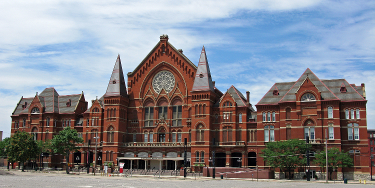 Ozias Pond recorded in his diary that Sam was examined by a phrenologist (reading bumps on the head). Cardwell writes that Ozias, “infected with the humor of the two writers and amazed at Twain’s extravagance punned feebly: ‘There was nothing in it’”Mark Twain Day By Day
Ozias Pond recorded in his diary that Sam was examined by a phrenologist (reading bumps on the head). Cardwell writes that Ozias, “infected with the humor of the two writers and amazed at Twain’s extravagance punned feebly: ‘There was nothing in it’”Mark Twain Day By Day
Crowded houses for both shows
"Ennuied theater-goers, sated with "patent insides" plays like somebody or other's Confectionery, the Work-house Convict, Stuffed Doll, Skipped by Daylight, Consternation, and similar productions, found infinite relief last night listening to the readings given by Mark Twain and Geo. W. Cable. They must have felt flattered by the audience that greeted them, for, in addition to being of goodly size, it was made up of the best of society people. Cable was the first to appear. He is small, dapper, and so slight that his dress suit clings rather than fits to his frame. After being introduced he seated himself at one of the tables on the stage and waited until the late comers had been shown their chairs. His colorless face, encircled with abundance of dark hair, did not suggest risible tendencies, and his long pointed beard, suggestive of a cheap stage make-up for the villain's part, was also against his present calling. Taken altogether, he had the look of an overworked student who was cultivating brain at the expense of physique. When silence obtained he came forward and began the entertainment in a disappointing voice, for it was weak, effeminate, and thin, and had a metallic quality that could scarcely be called agreeable. Throughout the evening his selections were entirely from one of his own works, the name of which was prominently displayed at the beginning of every one of his numbers on the programme, the text following it in smaller type. Either the man is infatuated with his own work or takes this means of bolstering its sale. Ill-advisors have put him forward as a humorist lecturer when the pathetic is far better suited to his abilities. On several occasions this fact was proved, and in "Mary's Night Ride" he reached a point bordering on the tragic. As he reached the climax in this selection his words were delivered with a dramatic effect so thrilling as to send cold chills through every listener. He was heartily applauded for this and had to answer a recall, as on a former occasion, when he gave three quaint little creole songs, of singular and haunting tune. Reciting the English words first, he followed with the Creole patois original in a wierdly musical voice. In strong contrast to Mr. Cable, Mark Twain is tall, awkward, gestureless, with a shock head of iron-gray hair and a deeply-furrowed, tired face. With all these rostrum disadvantages, he enters upon the stage, nevertheless, with the self-possessed ease of a man passing into his own drawing-room. The look upon his features suggests that he has mislaid his eye-glasses and has returned to look for them. Finding a number of persons present, he stops and has a long talk with them, during which they are the most willing listeners in the world. To describe his voice is almost next to impossible. Persons who have heard Frank Mayo can form something like an idea of its peculiarities. It is a thoroughly down East nasal tone, flowing with the steadiness of a brook in words that, though scarcely separated, are perfectly distinct and rich in their delicious drollery. There is not a sentence but what conceals a mirth-provoker of some kind, that jumps out at the most unexpected time and place. Concluding his remarks, he ambles off the stage with a funny little trot, as if he was wild to get out of sight as soon as possible to have a roar all by himself." The (Cincinnati) Enquirer 1885: January 3 Courtesy Touring with Cable and Huck
Sam wrote from Cincinnati to Livy:
“Livy darling, we finished one of those awful days, where you talk twice in the same day. It is a dreadful pull on a body’s muscle.”
Sam told of a young college girl from the music college where the hall was, asking him if the readings were over and if Mark Twain was going to read again, and would “he read something good?” Sam answered affirmatively and took the girl back stage, giving her a seat off-stage. When other girls came looking for her he gave them seats with the first girl. “Then I went on the stage & shouted away, for the delectation of 1200 women in front, & this little group in the rear. Take it all around, we had a mighty rousing time, & a most pleasant afternoon” [MTP].Mark Twain Day By Day
Sunday, January 4, 1885:
Sam wrote from Cincinnati to Livy of the day’s activities:
“I breakfasted with the Halstead family at noon; spent 3 hours in the pottery, dined (over) at Mrs. Geo. Ward Nichols’s; spent a most shouting good lovely 3 1⁄2 hours at Pitts Burt’s fireside; & then he brought me home, & I have just now got my clothes off.”Mark Twain Day By Day
Monday, January 5, 1885: Louisville, Kentucky--Liederkranz Hall
Sam rose at 6 AM and took a train to Louisville, Kentucky (Cardwell says 8:15 AM train [34] ). They stayed at the Galt House At 4:30 they went to a reception at the Louisville Press Club, and a stop at the Pendennis Club [Cardwell 34]. In the evening, Sam and Cable gave a reading at Leiderkranz Hall. En route, Cable wrote to his wife Lucy about distractions in the audience during performances:
"The other night, in Hamilton, O., a man with creaking shoes stalked out of the hall in the midst of one of Mark’s numbers. You know I told you we had decided to give any such person’s a shot across his bows. So Mark calls out in the most benevolent & persuasive tone, “Take your shoes off, please; take your shoes off” — to the great delight of the applauding audience [Turner, MT & GWC 82]. Mark Twain Day By Day
"Mark Twain's humor is indescribable, as it is inimitable. His "Tragic Tale of a Fishwife," in its wild absurdities and extravagant incongruities, was greeted with continuous laughter, the appreciation of the situation, no doubt, being heightened by the recollection that last winter there was in Louisville a professor who promised to teach the German language in six weeks, and in the audience there were several score who once thought they had learned it in that time. Mark Twain promises to-night, in addition to regular programme, to tell the story of the "Jumping Frog." There should be to-night even a larger audience than on last night, and it is to be hoped those who secure seats in advance will obtain them, and the annoyance experienced last night be avoided." The Louisville Courier-Journal 1885: January 6, courtesy Touring with Cable and Huck
Tuesday, January 6, 1885: Louisville, Kentucky--Liederkranz Hall
After the readings, Sam and Cable went again to the Pendennis Club with Sam’s second cousin by marriage, Colonel Henry Watterson, and editor of the Louisville Courier-Journal. Sam enjoyed a “2-hour supper which was full of delightful conversation, & also full of tropic enthusiasm over the readings” [Jan. 7 to Livy, MTP]. Cable wrote home that Watterson “didn’t please” him, “Talks shamelessly about getting drunk &c &c.” In a discussion of the “negro question” at the Press Club, Cable observed, “Freedom of speech has yet to come to us of the South” [Turner, MT & GWC 83].Mark Twain Day By Day
Wednesday, January 7, 1885: Indianapolis, Indiana--Plymouth Church
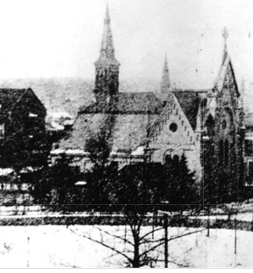 Sam wrote to Livy on the train from Louisville, Ky. to Indianapolis, Ind, relating the dinner of the last evening at the Pendennis Club. Sam remarked on the differences of a Southern audience: In truth, Baltimore, Washington & Louisville prove that none but a Southern audience can bring out the very best that is in a man on the platform. There is an atmosphere of affection for you, pervading the house, that you seldom feel, at least in a strong inspiring way, in a northern audience. If you make a miss-fire, they are troubled about it, not glad of it, & jump eagerly at the very first excuse they get to wipe it away & shout the memory of it out of your mind. One feels as if he were in front of his own family, & every individual personally anxious for his success [MTP].Mark Twain Day By Day
Sam wrote to Livy on the train from Louisville, Ky. to Indianapolis, Ind, relating the dinner of the last evening at the Pendennis Club. Sam remarked on the differences of a Southern audience: In truth, Baltimore, Washington & Louisville prove that none but a Southern audience can bring out the very best that is in a man on the platform. There is an atmosphere of affection for you, pervading the house, that you seldom feel, at least in a strong inspiring way, in a northern audience. If you make a miss-fire, they are troubled about it, not glad of it, & jump eagerly at the very first excuse they get to wipe it away & shout the memory of it out of your mind. One feels as if he were in front of his own family, & every individual personally anxious for his success [MTP].Mark Twain Day By Day
Ozias made Mark happy by playing billiards with him and Cable was made happy, no doubt, by testimony on the front page of the Indianapolis Journal to his growing reputation as a champion of civil rights for the Negro. (pg 35 Cardwell)
Cable toured the Louisville High School with Prof. Allmond and others, as well as the Colored High School—both schools singing “America” for him. Cable pled fatigue and Sam went alone to to dine at Watterson’s home. Cable grabbed two hours sleep then ate with Sam and went to the reading, which he reported so crowded that “Pond turned people away” [Turner, MT & GWC 84-5].Mark Twain Day By Day
"The most unique and thoroughly enjoyable entertainment ever given in Indianapolis was the Mark Twain- George W. Cable readings at Plymouth Church, last night, and they were given before one of the finest audiences that could be gathered, the auditorium of the church being completely filled in parquette and galleries. From first to last the immense assembly was in hearty sympathy with the readers, and, for a time, it looked as if the intention was to hold them all night." From Indianapolis Journal 1885: January 8, Courtesy: Touring with Cable and Huck
Thursday, January 8, 1885: Springfield, Illinois--Chatterton's Opera House
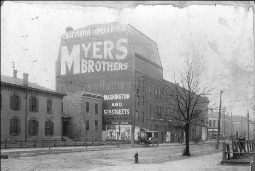 Sam wrote en route from Indianapolis to Springfield, Ill. to Livy: We were up at 7, this morning, with a 9-hour journey before us & no parlor car. But we are getting along all right. The train stops every half a mile. It is now 1 p.m., & this car has been filled & emptied with farmer-people some 300 times. They are a constant interest to me—their clothes, their manners, attitudes, aspect, expression—when they have any. A small country boy, a while ago, discussed a negro woman in her easy hearing-distance, to his 17-year old sister: “Mighty good clothes for a nigger, hain’t they? I never see a nigger dressed so fine before.” She was thoroughly well & tastefully dressed, & had more brains & breeding than 7 generations of that boy’s family will be able to show [MTP].Mark Twain Day By Day
Sam wrote en route from Indianapolis to Springfield, Ill. to Livy: We were up at 7, this morning, with a 9-hour journey before us & no parlor car. But we are getting along all right. The train stops every half a mile. It is now 1 p.m., & this car has been filled & emptied with farmer-people some 300 times. They are a constant interest to me—their clothes, their manners, attitudes, aspect, expression—when they have any. A small country boy, a while ago, discussed a negro woman in her easy hearing-distance, to his 17-year old sister: “Mighty good clothes for a nigger, hain’t they? I never see a nigger dressed so fine before.” She was thoroughly well & tastefully dressed, & had more brains & breeding than 7 generations of that boy’s family will be able to show [MTP].Mark Twain Day By Day
On the train Sam “spent an hour rewriting a boasting match (probably from Chapter 3 of Life on the Mississippi) so that he and Cable could hurl brags at each other ‘for Pond’s amusement’ at night in their rooms” [Cardwell 36]. At 3 PM Sam added to the letter from Decatur, Ill. They’d got on the wrong train but noticed it at the last moment, “just time enough to snatch on our wraps & overshoes & skip aboard the right train.” Sam added a paragraph accusing James G. Blaine of betraying his wife [MTP].Mark Twain Day By Day
"The Twain-Cable combination was greeted last night by the largest "downstairs" audience that has assembled in the Opera House this season, and it is safe to say that few audiences have congregated there composed of more intelligent and cultivated people. The entertainment was all that was promised, and the audience testified their delight by numerous bursts of laughter and applause. "Mark Twain's" first peek-a-boo at R.1.E. was greeted with laughter, and his droll recitations of his own funny stories tickled his hearers prodigiously. Mr. Cable's readings were so unlike Twain's stories that a pleasing contrast was formed. His selections from his own novel, "Dr. Sevier," were given with wondrous grace and effect, captivating the audience and winning genuine applause. His graphic description of "Mary's Night Ride" was realistic in the extreme, while Twain's final effort, a ghost story, was impressive as well as vehemently ludicrous. The combination is a strong one, and with a good management, "there is millions in it" for both the actors and their manager." The (Springfield) Daily Illinois State Journal 1885: January 9, courtesy Touring with Cable and Huck
Friday, January 9, 1885: St. Louis, Missouri --Mercantile Library Hall
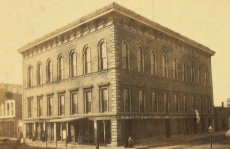 Train accident on the bridge over the Mississippi River. The engine and baggage car jumped the track. The three entertainers walked across the bridge, took a car to the Southern Hotel, and that night were welcomed by a large audience (pg 37 Cardwell)
Train accident on the bridge over the Mississippi River. The engine and baggage car jumped the track. The three entertainers walked across the bridge, took a car to the Southern Hotel, and that night were welcomed by a large audience (pg 37 Cardwell)
James Lampton, the original for Colonel Sellers, dropped in for free tickets for the show.
"This literary conspiracy," as Mark Twain describes the entertainment given by Mr. George W. Cable and himself, is really a very novel and agreeable affair. The idea of an author reading selections from his own works is not a new one, to be sure; Dickens introduced it many year ago, with pronounced success, and others have since adopted it from time to time, with results of various kinds. But this is the first case, we believe, in which two authors have "joined teams" for reading purposes; and certainly no two more widely-read and popular current writers, and yet two writers more distinctly unlike in their literary methods and their personal characteristics, could easily be brought together as a platform attraction. One is blunt, audacious and strongly individualized; the other is delicate, decorous, and not at all self-assertive except in the sense of aiming to do well what is put before him. They appeal to an audience in ways entirely different, just as they are known to write from entirely different points of view; and not the least interesting feature of the entertainment is the chance it affords for noting the shifting and denoting manner in which their recitations--for they recite almost all their "readings"--are received in turn by their hearers. One compels outright laugher, while the other seldom achieves more than smiles and a light murmur of gratification. Those who applaud the one do not always applaud the other; and yet it is hard to tell at the end which has seemed to make the surer impression, so much depends upon the fact that they must be judged together to be judged definitely." St. Louis Daily Globe Democrat 1885: January 11
See Touring with Cable and Huck for reviews and a publicity article describing their arrival in St. Louis, and the trouble on the new bridge across the Mississippi that almost kept them from getting there
Saturday, January 10, 1885: St. Louis, Missouri --Mercantile Library Hall
In the evening, Sam and Cable gave a second performance in Mercantile Library Hall , St. Louis. The Post Dispatch, and the Daily Globe-Democrat gave the pair positive reviews [Railton]. Cardwell says the crowd was not good, and according to Ozias Pond, Saturday night was “not popular in St. Louis ‘with the better element’.” [Cardwell 37].Mark Twain Day By Day
Sunday, January 11, 1885:
Monday, January 12, 1885: Quincy, Illinois--Opera House
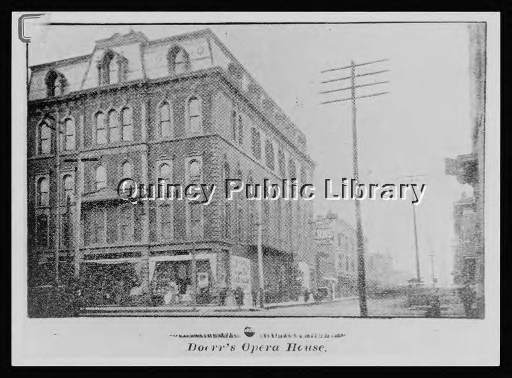 Cable and Ozias stood waiting with bated breath in the Southern Hotel on Monday morning, January 12, while Mark, enraged by the necessity for rising in time to catch a train at 9:40, attacked a refractory window shutter. Ozias noted in his diary that Mark won the bout. (pg 41-42 Cardwell)
Cable and Ozias stood waiting with bated breath in the Southern Hotel on Monday morning, January 12, while Mark, enraged by the necessity for rising in time to catch a train at 9:40, attacked a refractory window shutter. Ozias noted in his diary that Mark won the bout. (pg 41-42 Cardwell)
Clemens and Cable stayed with Sam's relatives by marriage, the widow of Erasmus Mason Moffett and her daughters. (pg 42 Cardwell)
Packed house.
There are two contrasting reviews of this show at Touring with Cable and HuckOne from The Quincy Daily Herald 1885: January 13, which is very positive; and the second from The (Quincy) Daily Journal 1885: January 13, which is not so positive.
"To our notion the biggest part of the show was Mark Twain himself. And when a man says "I saw Mark Twain last night," he has said the largest thing that can be said about the whole affair. Mark Twain is a famous character -- and there is something in human nature that makes us wish to see famous characters. We cannot conscientiously set a very high estimate upon the Twain-Cable entertainment. To see Mark Twain is an event in itself; but no one would particularly care to hear the Twain-Cable entertainment repeated. Little, plain, simple, unpretending Bob Burdette gave an entertainment at our opera house one night all by himself that discounted the Twain-Cable entertainment one thousand per cent. Bob's lecture was rich in wit and humor, and rich in pathos. It was a feast of rich things."
Tuesday, January 13, 1885: Hannibal, Missouri--Opera House
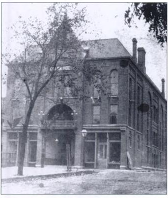 "In Hannibal on Tuesday, the thirteenth, Twain and Cable stayed with friends, Pond "made out," though badly, at the Park Hotel. A flood of reminiscences was set off among the residents by Sam Clemens' return to his old home, and a sizable crowd attended the reading, though not as large, Ozias noted cynically, as in other places. Clemens was, of course, in great demand among old friends." From Cardwell page 44
"In Hannibal on Tuesday, the thirteenth, Twain and Cable stayed with friends, Pond "made out," though badly, at the Park Hotel. A flood of reminiscences was set off among the residents by Sam Clemens' return to his old home, and a sizable crowd attended the reading, though not as large, Ozias noted cynically, as in other places. Clemens was, of course, in great demand among old friends." From Cardwell page 44
On November 11, 1884 Sam wrote from Boston to James B. Pond, sending revised programs for two New York nights. Jan. 13 was one of the open dates there and Sam hoped he might read in Hannibal, Mo. on Jan. 12 and the next night in Keokuk. He advised Pond not to “sell the show” in Hannibal but to write to Sam\’s old schoolmate, John H. Garth and he\’d put Pond in touch with the right people. Sam wished to give all of his Hannibal proceeds to “some charity of the town” [MTP]. "Mark Twain Day By Day
Wednesday, January 14, 1885: Keokuk, Iowa--Opera House
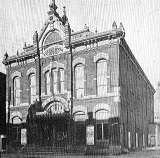 Delayed by a snowstorm, and “Long past midnight,” Sam wrote from Keokuk, Iowa to Livy. He’d had “no time to turn around, for 2 or 3 days” and so was behind in his letters. He wrote poignantly of his mother and of Hannibal, and an old friend since childhood, Tom Nash. Nash had been deaf and dumb for 40 years and handed Sam a letter which he read and sent to Livy to keep.A beautiful evening with ma—& she is her old beautiful self; a nature of pure gold—one of the purest & finest & highest this land has produced. The unconsciously pathetic is her talent—& how richly she is endowed with it—& how naturally eloquent she is when it is to the fore! What books she could have written!—& now the world has lost them. The visit to Hannibal—you can never imagine the infinite great deeps of pathos that have rolled their tides over me. I shall never see another such day. I have carried my heart in my mouth for twenty-four hours[MTP].Mark Twain Day By Day
Delayed by a snowstorm, and “Long past midnight,” Sam wrote from Keokuk, Iowa to Livy. He’d had “no time to turn around, for 2 or 3 days” and so was behind in his letters. He wrote poignantly of his mother and of Hannibal, and an old friend since childhood, Tom Nash. Nash had been deaf and dumb for 40 years and handed Sam a letter which he read and sent to Livy to keep.A beautiful evening with ma—& she is her old beautiful self; a nature of pure gold—one of the purest & finest & highest this land has produced. The unconsciously pathetic is her talent—& how richly she is endowed with it—& how naturally eloquent she is when it is to the fore! What books she could have written!—& now the world has lost them. The visit to Hannibal—you can never imagine the infinite great deeps of pathos that have rolled their tides over me. I shall never see another such day. I have carried my heart in my mouth for twenty-four hours[MTP].Mark Twain Day By Day
See Touring with Cable and Huckfor a review in The (Keokuk) Daily Gate City 1885: January 15
Thursday, January 15, 1885: Burlington, Iowa--Opera House
Cable rose at four in the morning to catch a train, reaching Burlington, Iowa at a quarter to seven. Sam stayed behind in Keokuk to spend more time with his mother, Jane Clemens [Turner, MT & GWC 88]. The Keokuk Gate City ran an article discussing Sam’s lectures and his greetings to his mother [Tenney 14].Mark Twain Day By Day
Delayed by a storm Cable held the audience for more than an hour and one half. Twain finally arrived but cut himself short and didn't talk well. (pg 46 Cardwell)
“For once Twain was accepted as a literary man, not just a humorist.” (pg 46 Cardwell)
"When Mark Twain finally appeared, his first task was to explain the delay. He said he had stopped through the day with his mother in Keokuk. She was eighty-two years old; she was the only mother he had; their homes being a thousand miles apart he might never see her again. He thought he could trust the St. Louis train, but his trust was betrayed. It started from Keokuk an hour late, and had been getting an hour later ever since. On the way they broke something. A dispute arose as to what it was that was broken. It took forty minutes to decide the dispute, and five minutes to repair the damage. He detailed his disastrous experience with the German language, wove all the erratic applications of the German genders into the "Tragic tale of the fishwife," described a "trying situation" in his foreign travels, in which an American young lady whom he fails to recognize, insists upon talking to him about "old times," etc." from The (Burlington) Daily Hawk-Eye 1885: January 16, courtesy Touring with Cable and Huck
Friday, January 16, 1885: Chicago, Illinois--Central Music Hall
Saturday, January 17, 1885: Chicago, Illinois--Central Music Hall
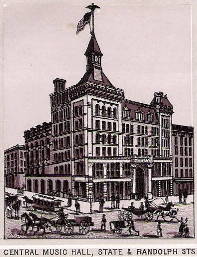 “...his [Mark's] new plan called for Cable's opening the show with a fifteen-minute talk while the house assembled; and even with all the encores the two of them did not hold the audience for more than two hours. Sam confided joyfully to Livy that now 'only half the house hears C's first piece – so there isn't too much of C. any more – whereas heretofore there has been a thundering sight too much of him.'” (pg 48 Cardwell)
“...his [Mark's] new plan called for Cable's opening the show with a fifteen-minute talk while the house assembled; and even with all the encores the two of them did not hold the audience for more than two hours. Sam confided joyfully to Livy that now 'only half the house hears C's first piece – so there isn't too much of C. any more – whereas heretofore there has been a thundering sight too much of him.'” (pg 48 Cardwell)
"Mr. Clemens was recalled after every recitation. He kept his hearers in a perpetual roar, and he did his best undoubtedly, as during the evening he took occasion to thank his audience for their attendance upon such a blustering night. He unwittingly created a great deal of merriment by failing to find the proper exit leading to the waiting-room, where he sat during his associate's recitations. He crossed the stage twice, tried every door, and was amazed at the great number of wrong doors he could find. He appeared to be as greatly amused as the laughing lookers-on, and finally dove through a doorway after murmuring "Guess I rehearsed with the wrong door." "I admire this elegant building," said Mr. Cable, laughing heartily at the other's discomfiture, "but I do think a guide should be provided for strangers." All of Mark Twain's selections were from his "Innocents Abroad," except one from the advance sheets of his latest production, "The Adventures of Huckleberry Finn." Chicago Tribune 1885: January 17, courtesy Touring with Cable and Huck
Cable wrote home that the Chicago readings were “one of the greatest successes, if not the very greatest, artistic and pecuniary success of our season. The thermometer is 4° below zero and falling.” Clemens’s story of Huck Finn & Tom Sawyer liberating runaway [Jim] was received with a continual tempest of merriment and when I gave “A Sound of Drums” I saw persons in tears all over the house. I was called back twice after my Creole songs and twice after “Mary’s Night Ride.” Mark & I both seemed especially inspired tonight & to inspire each other.” Along the tour people came up to Cable and thanked him, often in tears, for his Freedman paper [Turner, MT & GWC 89].Mark Twain Day By Day
Sunday, January 18, 1885:
Sam finished the letter to Livy, writing in the morning and after breakfast adding to it at noon, when he wrote about the Chicago readings: We’ve had an immense time here with these three big audiences in this noble Central Music Hall. But for the fearful storms, we would have turned people away from the doors. It is a beautiful place, & you should have seen that alert & radiant mass of well-dressed humanity, rising tier on tier clear to the slope of the ceiling. Last night was the greatest triumph we have ever made. I played my new bill, containing The Jumping Frog of Calaveras County (cut it down & told it in 13 minutes—quickest time on record) & Tom & Huck setting Jim free from prison—25 minutes—but it just went with a long roll of artillery—laughter all down the line...& after a thrice-repeated crash of encores, I came back & talked a ten-minute yard (Gov. Gardiner)—on the state 35 minutes, you see, & no harm done—encored again after the encore, & came back & bowed. And mind I tell the old Jumping Frog swept the place like a conflagration. Nothing in this world can beat that yarn when one is feeling good & has the right audience in front of him [MTP].Mark Twain Day By Day
Monday, January 19, 1885: Evanston, Illinois--First Methodist Church
A large audience turned out despite intense cold. (pg 48 Cardwell)
See the Review from The Evanston (Illinois) Index 1885: January 24, courtesy Touring with Cable and Huck
Tuesday, January 20, 1885: Janesville, Wisconsin--Opera House
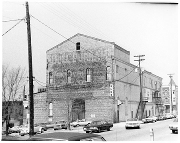 Cable wrote home: Arrived here at 1/30 P.M. from Chicago. Snow, snow, snow! But clear skies overhead and sweet sunshine. So let it be in your heart. Now I must be off to bed so as to be fresh tonight. My health & strength need give you no concern. I weigh 111 pounds...” [Turner, MT & GWC 90]. Note: Cable seldom weighed more, and often less than 100 pounds.Mark Twain Day By Day
Cable wrote home: Arrived here at 1/30 P.M. from Chicago. Snow, snow, snow! But clear skies overhead and sweet sunshine. So let it be in your heart. Now I must be off to bed so as to be fresh tonight. My health & strength need give you no concern. I weigh 111 pounds...” [Turner, MT & GWC 90]. Note: Cable seldom weighed more, and often less than 100 pounds.Mark Twain Day By Day
See Touring with Cable and Huck for review.
Wednesday, January 21, 1885: Madison, Wisconsin--First Methodist Episcopal Church
See Touring with Cable and Huck for review.
Sam wrote from Madison, Wisc. to Livy. He reported that it had been seven days since the thermometer had risen above zero; it was ten below at the time of his letter, but he was in his “bag, in bed, & unspeakably snug & comfortable. That bag is the greatest thing in the world.” He wrote of meeting Lucius Fairchild, brother of Charles Fairchild and ex-governor of Wisconsin from 1866-1872: Got here at 2:30 pm & ate dinner & went at once to bed—as usual. Fairchild came in, a moment (poor fellow, he will be defeated for U.S. Senate tonight—he told us so himself) & said the girls are out of town; asked us to supper—declined. We didn’t go to see Emma Sayles...[MTP]. Note: Emma Sayles (Mrs. Henry Sayles) (1844-1916).
Sam wrote that they would leave Madison at midnight. Cable wrote that it was midnight and they must take a train after 1 AM. “I can’t write. Mark Twain is telling California yarns to Ozias and Kark Strakasch” [Turner, MT & GWC 90].
Sam also wrote Charles Webster, reminding him to look into the stock of the Hayword Hand Grenade Co. and see what the cost would be [MTP]. Note: the Hayword were bottles of water to be thrown at a fire.
The Fort Madison Democrat: “Lecture Trips and Visits of Mark Twain in Iowa.” Sam commented on local Indians [Scharnhorst, Interviews 74-6].Mark Twain Day By Day
"Mark Twain and Geo. W. Cable entertained a crowded house at the Methodist church last evening. The audience was kept in a continual roar of laughter for two hours and went home with the assurance that the "troop," as Mark Twain called it, would return to Madison on the 27th of this month."
Thursday, January 22, 1885: La Crosse, Wisconsin--Opera House
"Mr. Clements [sic] opened his budget of fun with “King Sollermunn,” the sketch printed in the January Century. Next he gave his queer experiences with the German noun, illustrating with the “Tragic Tale of a Fishwife.” This brought an encore to which he responded with the sketch of the stammering man who “cured himself” by whistling. His third number was “A Trying Situation” somewhat improved from a sketch in his “Innocents Abroad.” Again there was a recall, and he related the story of how the old salt shook hands with the governor. The evening closed with the story of the ghost with the golden arm."
"Mr. Clement's [sic] manner is inimitable as it is indescribable. He comes upon the stage as though looking for a pin on a floor covered with eggs. He disappears with a canter and if he had not said a word, there would still be something to laugh at. His gestures have a studied awkwardness and every movement has a purpose. Speech falls from his lips as though against his will. Commonly the right elbow is supported by the left hand, and when his arms fall to his side, volumes could not say more. In respect to his part of the programme, there was no best or worst; nothing was better than something else. He is funnier to see and hear than to read, and to that, nothing can be added."
Sam wrote from St. Paul, Minn. to Charles Erskine Scott Wood, his old West Point friend, who evidently had asked Sam why he never poked fun at Jews. I have never felt a disposition to satirize the Jews. I have no reason to offer for I think it is a matter of feeling not a conscious intellectual impulse. Hang it, what I am trying to say is, that I have never had the disposition....But the intellectual origin of the disposition lies mainly in two facts, I think; (and they long ago deeply impressed me) that I have never seen a Jew begging his bread; and have never seen one procuring it by Manual labor. The one fact must mean that the Jews take care of their unfortunates with a fidelity known to no other race; and the other fact must mean that the Jews are the only race with whom brains are a universal heritage (by contrast consider the Irish race.) We do not satirize people we singularly respect—one would do it but indifferently well, and be ashamed of it when it was done. Twenty years ago I knew Adolph Sutro well (of Sutro Tunnel)—a fine, manly beautiful character; and I have always found something of Sutro is a sufficient equipment for an average man. No, I never knew Ben Holiday—I only knew of him [MTP]. Note: See also Feb. 5 from Morris W. Fechheimer.Mark Twain Day By Day
Friday, January 23, 1885: St. Paul, Minnesota--Market Hall
Sam wrote from St. Paul to Livy, who’d asked if Pond ever failed to mail his letters. Sam didn’t think so and told the story of Orion taking one of his letters to the post box and when he got there forgetting why he’d gone, returning with the letter still in his pocket. Sam also related walking nine blocks to see the “ghost,” a “mysterious something on a school-house window pane,” which various people saw as various objects or persons. If all the fools in the world should die, lordy God how lonely I should be. Sam told of meeting old printer pals: In Quincy I saw—well, first it was an old man with bushy gray whiskers down to his breast, & farmer-like clothes on. When I saw him last, 35 years ago, he was a dandy, with plug hat tipped far forward & resting almost on his very nose; dark red, greasy hair, long, & rolled under at the bottom, down on his neck; red goatee; a most mincing, self-conceited gait—the most astonishing gait that ever I saw—a gait possible nowhere on earth but in our South & in that old day; & when his hat was off, a red roll of hair, a recumbent curl, was exposed (between two exact partings) which extended from his forehead rearward over the curve of his skull, & you could look into it as you would into a tunnel. But now—well, see Holmes’s “the Last Leaf” for what he is not. And there also I saw Wales McCormick, the giant printer-cub of 35 years ago—he & I were apprentices & the above dude, Pet McMurry, was the journeyman [MTP].Mark Twain Day By Day
"Any one ignorant of the humorist's identity would have taken him for one of the chief mourners at a well-regulated funeral, or a life-long victim of dyspepsia and melancholia, in the acutest forms. He began business at once. His voice was the same old, characteristic nasal drawl, in which the public refused to see anything eloquent, or even pleasing, when he essayed (unsuccessfully) to be a lecturer some ten years ago, but which is now accepted as almost as convulsive as the humorist's utterances themselves." Saint Paul Daily Dispatch 1885: 24 January, coutesy Touring with Cable and Huck
Saturday, January 24, 1885: Minneapolis, Minnesota--The Grand Opera House
See Touring with Cable and Huck for review.
"Mr. Clemens' selections were "King Sollermunn," from the "Adventures of Huckleberry Finn," "The Tragic Tale of the Fishwife"--a vastly funny burlesque on the queer genders of the German language--"A Trying Situation" and "A Ghost Story." The "Fishwife" was recalled, whereupon Mr. Clemens tried on the audience a little bit of stammering work that went very well. "The Ghost Story" was a good deal of a chestnut, but the ex-pilot did it admirably and there was a great shout of laughter when the disclaimer, at the end of his long and harrowing account, shouted "boo!" and the ladies of the audience jumped up and screamed in terror. The manner in which Mr. Clemens gets on and off a stage is a sight to behold. He starts on in a funny little jog trot, half sideways, with his eyes cast up to the gallery, with a comical look of half inquiry and half appeal. Then he begins to deliver his humorous conceits with an expression of placid and childlike innocence that is almost as ludicrous as the words he is uttering. His gestures are eloquent, if not graceful, and would make any audience laugh, even if Mark had nothing to say. With these accessories his oldest story becomes just as fresh as though it were "fire-new from the mint.""
Sunday, January 25, 1885:
Sam wrote from Minneapolis to Charles Webster, again about business matters—the bed clamp, Osgood’s statement, books sold, American Publishing Co., and money Webster needed, probably for continued production of Huck Finn. Sam ended with, I ought to have staid at home & written another book. It pays better than the platform [MTP].Mark Twain Day By Day
Monday, January 26, 1885: Winona, Minnesota--Philharmonic Hall
Winona Daily Republican; Jan 27, 1885
Innocents Abroad.
Mark Twain and Geo. W. Cable
The large audience assembled to hear Mark Twain and Geo. W. Cable last evening were not kept waiting. The curtain was up at Philharmonic Hall when the people entered. The stage was set with a drawing-room scene, a table covered with a red spread and a plain chair. It was about ten minutes after 8 o'clock when Mr. Cable came upon the stage attired in a faultless evening suit. He is slightly built, with a forehead high and prominent, a beard and heavy mustache and a piercing eye that rivets attention. His selections opened with the scene between Narcisse and John and Mary Richling, in his own work, Dr. Sevier, (which he pronounces Severe.) It was a fine bit of dialect recitation, and at once placed him in good favor with the house. Then Mark Twain came on with a sort of side-long awkward stride, amusing in itself. He is not as tall as his picture would lead one to expect. His heavy head of hair plentifully streaked with gray adds to the marked personal characteristics of the man. His speech was slow and measured with a peculiar drawl that imparted an added effect to his recitations. He has an easy way of supporting his right elbow with his left hand that gives a natural and easy force to his gestures. His opening selection was a laughable sketch entitled “King Sollermann,” from his forthcoming book entitled “The Adventures of Huckleberry Finn,” which was heartily applauded. Mr. Cable followed in another highly enjoyable selection from Dr. Sevier, and then Twain gave the “Tragic Tale of the Fishwife,” preceded by a side-splitting description of his struggles in learning German and the interminable difficulties he encountered in the adjectives and nouns. In answer to a recall Mr. Clemens gave his famous description of “Buck Fanshawe's Funeral,” which kept the house in a continual strain of laughter. Mr. Cable gave two other selections from Dr. Sevier, his closing number being “Mary's Night Ride.” It was given with remarkable dramatic fervor and resulted in an enthusiastic recall. He merely bowed his acknowledgements. Mark Twain's last two numbers were “A Trying Situation,” a roaring remeniscene [sic] from Innocents Abroad, and A Ghost Story, which closed the evening. He bowed himself off the stage amid the laughter and applause of the house. It was a very satisfactory evening throughout.
Cable wrote that they had to “rise at 5 tomorrow morning to take cars. O how home-sick I am” [Turner, MT & GWC 91].Mark Twain Day By Day
Tuesday, January 27, 1885: Madison, Wisconsin--First Methodist Episcopal Church
“Ozias seems to have had a heart attack at Madison; nevertheless he accompanied the tour to Milwaukee, where he took to his bed. At this point a tug of war began between Clemens and J.B.Pond. The major wished to remain snugly ensconced at the Everett House in New York, but like most men, he lacked the force of character necessary to hold out against Clemens.” (pg 52 Cardwell)
See Touring with Cable and Huck for review.
" It would be impossible to do justice to the richness of the treat which Mark Twain offered. His dry recital of the desperate encounter he had with an interviewer was ludicrous in the extreme, and could only be appreciated upon being heard. The story of Huck Finn and Tom's Sawyer's brilliant achievement in rescuing a negro captive who was imprisoned in a cabin on the farm of Huck's uncle, kept the audience in a constant roar of laughter, while the stuttering story was unique and highly amusing. The anecdote of how Smiley's frog was charged with shot by a clever stranger, who afterwards won $40 from the owner in a jumping contest between a fresh frog from the marsh and the trained pet of Smiley's, was very entertaining. Twain closed by giving in all its details the narrow escape from a duel which he had with a rival editor while running a western paper, and claimed that the practice of dueling was pernicious and ought to be frowned down by all good citizens. He said that if he were challenged now, he would take the challenging party by the hand, gently lead him off into some quiet, secluded place and there--kill him."
Wednesday, January 28, 1885: Milwaukee, Wisconsin--Academy of Music
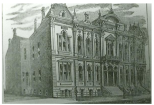 See Touring with Cable and Huck for review.
See Touring with Cable and Huck for review.
Mr. Cable rendered a number of Creole songs and recited "Mary's Night Ride" with remarkable dramatic intensity. Before commencing the recitation he said that the story of the life of John and Mary Richling had been told him by a friend. Mary's home had been in Milwaukee, and it was to Milwaukee she had come in the midst of her trouble, leaving her husband to battle so manfully alone in New Orleans. It was from Milwaukee she started out so bravely to reach her husband in the trying times of the war. He had looked forward to a visit to the city which had been the home of his heroine, with a hope that he might grasp the hand of that noble woman."
Thursday, January 29, 1885: Milwaukee, Wisconsin--Academy of Music
See Touring with Cable and Huck for review.
" Mark Twain and George W. Cable repeated their pleasing entertainnment at the Academy of Music, last night, giving a number of new selections. The audience was much larger than on the previous night and appeared to heartily enjoy the readings."
During the performance off stage, George Cable wrote to his wife, Lucy, of the struggle: Now here is the strangest thing! A house full of people, seemingly highly entertained but feeble in their final applauses. Mark was not called back & I, following, was so feebly encored that I did not feel justified in doing more than bowing. Fact is Mark is under a cloud tonight — feels it, confesses it, but cannot explain it. He doesn’t take hold of his hearers and swing them as usual. There! he gets it at last. Even now it came as a kind of after thought from the audience after they had entirely ceased clapping. But it came good and heartily. Strongest, heartiest kind of a reception to “Mary’s Ride.” Now Mark is on to finish; but I know he is going to come off wringing his hands with vexation. Fact is our hard railroad travel is telling on us — has let out — slackened — our nerves. Queerly, but truly, we feel it most after a partial resting spell... The clock strikes ten. The end is only a few moments away. Finis. Mark explains it all. He had a warm bath an hour before the reading. He’ll never take another [Turner, MT & GWC 92-3].Mark Twain Day By Day
Friday, January 30, 1885: Rockford, Illinois--Opera House
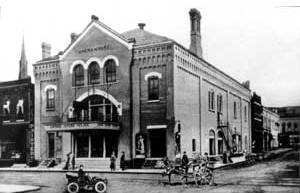 Sam and Cable gave a reading in Rockford, Illinois. Ralph Emerson and wife wanted Sam to “camp in their house, which is the best one in town (Rockford), but” he had to leave at 11 P.M . in a freight train [Jan. 31 to Livy, MTP]. Ozias Pond remained in Milwaukee, and his brother James was at the Everett House in New York City. James wrote Cable on this day arguing that he shouldn’t be expected to travel back, that he could send a “perfectly honest, industrious man,” but Sam would have none of it—this had been explicit in their contract—either James or his brother Ozias, no substitutes [Cardwell 52-3]. Off stage during Sam’s performance, George Cable wrote his wife Lucy: I am reminded by something Mark is saying, of what a fine instinctive art he has for the platform. He has worked & worked incessantly on these programmes until he has effected in all of them — there are 3 — a gradual growth of both interest & humor so that the audience never has to find anything less, but always more, entertaining than what precedes it. He says, “I don’t want them to get tired out laughing before we get to the end.” The result is we have always a steady crescendo ending in a double climax. My insight into his careful, untiring, incessant labors are an education ... There! It does me good to hear them call him back at the place where the encores generally begin, instead of letting him go as they did in Milwaukee last night[ Turner, GWC Bio. 93-4].Mark Twain Day By Day
Sam and Cable gave a reading in Rockford, Illinois. Ralph Emerson and wife wanted Sam to “camp in their house, which is the best one in town (Rockford), but” he had to leave at 11 P.M . in a freight train [Jan. 31 to Livy, MTP]. Ozias Pond remained in Milwaukee, and his brother James was at the Everett House in New York City. James wrote Cable on this day arguing that he shouldn’t be expected to travel back, that he could send a “perfectly honest, industrious man,” but Sam would have none of it—this had been explicit in their contract—either James or his brother Ozias, no substitutes [Cardwell 52-3]. Off stage during Sam’s performance, George Cable wrote his wife Lucy: I am reminded by something Mark is saying, of what a fine instinctive art he has for the platform. He has worked & worked incessantly on these programmes until he has effected in all of them — there are 3 — a gradual growth of both interest & humor so that the audience never has to find anything less, but always more, entertaining than what precedes it. He says, “I don’t want them to get tired out laughing before we get to the end.” The result is we have always a steady crescendo ending in a double climax. My insight into his careful, untiring, incessant labors are an education ... There! It does me good to hear them call him back at the place where the encores generally begin, instead of letting him go as they did in Milwaukee last night[ Turner, GWC Bio. 93-4].Mark Twain Day By Day
Saturday, January 31, 1885: Davenport, Iowa--Burtis Opera House
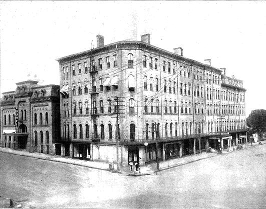 From Davenport, Iowa, Sam wrote of his recent travels to Livy: “...struck a sleeping-car train at 12.30 [A.M.], but did not go to bed, as we had to change cars at 2. 40. Did it, slept till 6, when we reached Rock Island; then Cable & I walked up through the town & over toward this place, when a sleigh overtook & we rode” [MTP].Mark Twain Day By Day
From Davenport, Iowa, Sam wrote of his recent travels to Livy: “...struck a sleeping-car train at 12.30 [A.M.], but did not go to bed, as we had to change cars at 2. 40. Did it, slept till 6, when we reached Rock Island; then Cable & I walked up through the town & over toward this place, when a sleigh overtook & we rode” [MTP].Mark Twain Day By Day
“Before leaving Davenport he [Twain] had a disagreement with Cable, who was unwilling to start for Chicago until Monday morning, as otherwise he would have been compelled to travel on the Sabbath. Twain boiled over and continued to boil for most of the rest of the tour. He complained to J.B.Pond and possibly at this time, wrote him a note in which he damned Cable as 'a Christ-besprinkled psalm-singing Presbyterian.'” (pg 55 Cardwell)
According to Sam’s Feb. 5 to Livy: It was announced that unless we left (Davenport) that night at 11, we could not meet our Chicago engagement Monday evening [Feb. 2]. Cable calmly said “I cannot travel on Sunday.” I was furious. I said “You will travel on Sunday, just the same,—this time.” He said, “It is in my contract that I am not to travel on Sunday, & I shall not do it.” I said, Damn your contract. This is the accident of a change of RR service since the appointment was made; & your contract cannot cover accidents, & has got to yield. I am not going to be made a plaything of in order to humor the corpse of a superstition of the Middle Ages” [MTP]
Sam wrote Livy Feb. 5 explaining how the impass was resolved: Better information settled the fact that he could start Monday morning at 8 & have abundance of time. If he had missed that engagement, I was going to deliver a lecture about him to the Chicago audience....I do not believe that any vileness, any shame, any dishonor is too base for Cable to do, provided by doing it he can save his despicable Sabbath from abrasion [MTP]Mark Twain Day By Day
Under the management again of James B. Pond
Sunday, February 1, 1885:
Sam wrote from Chicago, Illinois to Livy, giving her the future reading dates and reviewing the past few days. ...last night we made a great triumph before a great Davenport audience. At 7. 45 I was old & seedy & wretched from traveling all night & getting no sleep; but then I drank a big cup of black coffee & went on the stage as fine as a fiddle; answered an encore; was uproariously encored again, immediately; was encored again, straightway, & went on & made a happy excuse, & did the same after another encore at 9. 45. I guess we sent that multitude home feeling jolly. It was the only big audience that has assembled in that town since 1875. Took the train half an hour after midnight—had then been mainly without sleep for 2 days & nights—so we got a stateroom & I slept the night through. When I am in such trim as I was last night, I would rather be on the platform than anywhere in the world [MTP].
Sam did not forget that “tomorrow is the great day”—their fifteenth wedding anniversary.Mark Twain Day By Day
Monday, February 2, 1885: Chicago, Illinois--Central Music Hall
James B. Pond wrote again from New York to George W. Cable, pleading for time and not to be pushed. Pond had Henry Ward Beecher’s arrangements to make on another tour and summer expenses to make. Meanwhile, Ozias was still holed up in Milwaukee, unable to travel [Cardwell 53]. Sam and Cable gave a reading at the Central Music Hall, Chicago, Illinois. Sam tried a new program (Buck Fanshaw, Agricultural Editor, and the Blue-Jays) and was quite concerned with it, being unable to “deliver it to a dog” without being “full of haltings and stammerings.” From his Feb. 3 to Livy: “...at 7. 30 I drank a big cup of strong black coffee, & at 8. 20 went on the platform before a big house & put the Agricultural editor through spiritedly & without a flaw.” More coffee made the Blue-jays piece a “rattling success” also. Livy had asked if Sam had yet read The Bostonians, by Henry James:“Yes, I tried to read the Bostonians, but couldn’t. To me it was unspeakably dreary. I dragged along half way through it & gave it up in despair.”Mark Twain Day By Day
Sam had not yet turned against George W. Cable:“Speaking of Cable, he is no ordinary man, he is a great man; & I believe that if he continues his fight for the negro (& he will,) his greatness will come to be recognized—& it will be a greatness of a kind & size that will overshadow his merits as a novelist & make them small by contrast” [MTP].Mark Twain Day By Day
Tuesday, February 3, 1885: Chicago, Illinois--Central Music Hall
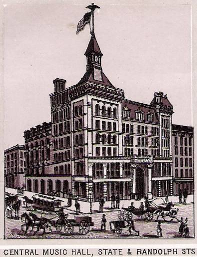 See Touring with Cable and Huck for review.
See Touring with Cable and Huck for review.
"A large audience again met George W. Cable and Mark Twain at Central Music Hall last night, leaving only a few seats vacant on the outskirts of the hall. Mr. Cable's recitations again received intelligent and smiling consideration, while Mr. Clemens convulsed the house with uncontrollable mirth. His account of the runaway slave's escape from the log cabin under the auspices of Tom Sawyer and Huckleberry Finn was irresistible. There will be another reading tonight."
Offstage during Sam’s performance, George Cable wrote his wife, Lucy: Mark is telling one of his very best numbers & the old surf-roar is booming. They will encore every number to the end. Ah! what a noble applause calls Mark back, continuing until he has returned entirely back across the broad platform to the footlights. Funny thing just now. I had been out & sung two Creole songs & on retiring the applause died down & Mark in his nervous way stepping out on the platform a little too promptly was met by a patterning encore intended for the singer. It was awkward for him, but he was equal to the emergency. He stood still a moment, then said in the drollest way imaginable — “I’ll go back and get him” — At which there was a roar of laughter & applause in the midst of which he came back to make his word good. Of course I would not go, so he went back and raised another laugh, saying, “He’s sung all he knows” — and went on with “The Jumping Frog,” which is getting a superb reception [Turner, GWC Bio 181].
Sam wrote from Chicago to Livy (see Feb. 2 entry). He also wrote to Susy Clemens, thanking her for the composition she’d sent, and praising it. He told about a very unusual man at the hotel: In this hotel, (the Grand Pacific) there is a colored youth who stands near the great dining room door, and takes the hats off the gentlemen as they pass into dinner & sets them away. The people come in shoals & sometimes he has his arms full of hats and is kept moving in a most lively way. Yet he remembers every hat, & when these people come crowding out, an hour, or an hour & a half later he hands to each gentleman his hat & never makes any mistake. I have watched him to see how he did it but I couldn’t see that he more than merely glanced at his man if he even did that much. I have tried a couple of times to make him believe he was giving me the wrong hat, but it didn’t persuade him in the least. He intimated that I might be in doubt, that that he KNEW. / Goodbye honey / Papa
Sam and Cable telegraphed from Chicago to Ozias W. Pond, Plinkinton House, Milwaukee, Wisc., who was ailing and feared near death. Sam had given Ozias a copy of Thomas Malory’s Le Morte d’Arthur, and addressed it to “Sir Sagramore le Desirous”—a nickname that stuck: Now wit you well, Sir Sagrarmore, thou good knight and gentle, that there be two that right wonderly do love thee, grieving passing sore and making great dole at thy heavy travail. And we will well that thou prosper at the hand of the leech, and come lightly forth of thy hurts, and be as thou were tofore [MTP].Mark Twain Day By Day
Wednesday, February 4, 1885: South Bend, Indiana--Opera House
Sam wrote from Chicago to Livy:Livy dear, we hit them again last night, & hit them hard. We have now appeared four times before big audiences here & made a ten-strike every time. The ghost story was simply immense. I made those 1600 people jump as one individual. It is a pity to leave Chicago. We could repeat here a week longer. We go to South Bend, Indiana, this afternoon toward 4 oclock. Charles Warren Stoddard is a Professor of English Literature 2 miles from there in a big Catholic College [MTP]. Note: Sam revealed in his Feb. 5 to Livy that the College was Notre Dame.Mark Twain Day By Day
See Touring with Cable and Huck for review.
Thursday, February 5, 1885: Fort Wayne, Indiana--Academy of Music
Sam wrote from South Bend, Indiana to Livy:Livy dear, we are grinding out the days pretty fast, now that we are at last fairly into the last month & unquestionably on the homestretch. Major Pond [James] is with us, now. He wanted to send his brother Edward, but we needed an expert, not a novice.Mark Twain Day By Day
“On February 5 he [Twain] blew off steam to Livy in a letter from South Bend: 'I do not believe that any vileness, any shame, any dishonor is too base for Cable to do, provided by doing it he can save his despicable Sabbath from abrasion. In him this superstition in lunacy--no idiocy—pure & unadulterated. Apart from this & his colossal self-conceit & avarice, he is all great & fine: but with them as ballast, he averages as other men & floats upon an even keel with the rest'”. (pg 55 Cardwell)
See Touring with Cable and Huck for review.
Friday, February 6, 1885: Indianapolis, Indiana--Plymouth Church
In the afternoon, Sam wrote from Lafayette, Indiana to Livy:We rose at 5.45 this morning & took a train which ought to have had us here at 10.30, but it lost 2 hours on the road. I slept a couple of hours on the way, & I feel rusty & seedy, now. I have not eaten for 12 hours & it will doubtless be another 12 before I do eat; for I got up with a sour stomach. Pond has just been in, mad. He went in to dinner with Cable, who was shown to a table where some children sat; & he whirled on his heel & marched out before everybody in grandiose style & told Pond to have his dinner sent to his room. Pond was deeply mortified at this fantastic exhibition of petty magnificence [MTP].
Sam and Cable gave a reading at the Plymouth Church, Indianapolis, Indiana. Sam’s black coffee again helped him through the evening reading, according to a Feb. 7 letter to Livy. Sam also mentioned enjoying a reading in Ft. Wayne on Feb. 5 in this letter. At 10:30 In the evening, Maurice Thompson, the poet, came by and visited until midnight.
The Lafayette Courier, p. 1: “Mark Twain Interviewed / His Views upon Subjects of Interest.” Sam joked about the local canal, the courthouse, and George Cable’s effect on audiences [Scharnhorst, Interviews 81-2].Mark Twain Day By Day
Saturday, February 7, 1885: Indianapolis, Indiana--Plymouth Church
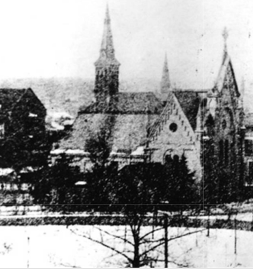 Sam got up at 7 AM and took a train to Indianapolis, Indiana. On the train he wrote to Livy, explaining how black coffee made him “cheerful, & easy, & confidential & conversational with the audience,” but it didn’t protect him from “disastrous lapses of memory which come of over-fatigue.” Sam was counting the days now till he would be home, “at half past 3 on a Sunday morning Feb. 22!” [MTP].Mark Twain Day By Day
Sam got up at 7 AM and took a train to Indianapolis, Indiana. On the train he wrote to Livy, explaining how black coffee made him “cheerful, & easy, & confidential & conversational with the audience,” but it didn’t protect him from “disastrous lapses of memory which come of over-fatigue.” Sam was counting the days now till he would be home, “at half past 3 on a Sunday morning Feb. 22!” [MTP].Mark Twain Day By Day
See Touring with Cable and Huck for review.
“He complained of his companion again on the sixth in a letter dated from Lafayette, Indiana” (pg 55 Cardwell)
Sunday, February 8, 1885:
Sam wrote from Indianapolis to Livy. He blamed Cable for his own supposed shortcomings: It is Cable’s fault that I have done inferior reading all this time. He has hogged so much of the platform-time that I have always felt obliged to hurry along at lightning speed in order to keep the performance within bounds; but now I take my own time, & give 25 minutes to pieces which formerly occupied but 15. If this show were new, I would cut a third of him out of the program....I am paying Cable $450 a week & expenses. He isn’t worth a penny over $200. He is not a novelty anywhere...his same old stuff...doesn’t prepare himself with untried matter....He will find a sickly way of making a living [MTP].Mark Twain Day By Day
Monday, February 9, 1885: Columbus, Ohio--Comstock's Opera House
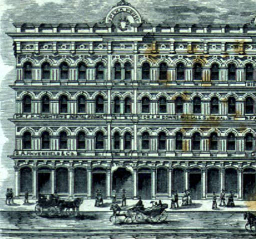 In Indianapolis, Sam wrote Livy a letter full of indignation and disgust with George W. Cable. He told of Cable interrupting an anecdote at a Saturday evening reception to tell him he was leaving (due to the Sabbath). Sam accused Cable of “insulting & insolent ways with servants” and relayed Pond’s opinion that the “servants of the Everett House all hate him,” and that he would starve himself if on his own expenses, but his “appetite is insatiable” if “somebody else is paying....” Sam said Cable wouldn’t even cross a bridge on a Sunday, though he’d wanted to hear Beecher. For Sam this was: “...the most beggardly disease, the pitiful, the most contemptible mange that ever a grown creature was afflicted withal” [MTP].
In Indianapolis, Sam wrote Livy a letter full of indignation and disgust with George W. Cable. He told of Cable interrupting an anecdote at a Saturday evening reception to tell him he was leaving (due to the Sabbath). Sam accused Cable of “insulting & insolent ways with servants” and relayed Pond’s opinion that the “servants of the Everett House all hate him,” and that he would starve himself if on his own expenses, but his “appetite is insatiable” if “somebody else is paying....” Sam said Cable wouldn’t even cross a bridge on a Sunday, though he’d wanted to hear Beecher. For Sam this was: “...the most beggardly disease, the pitiful, the most contemptible mange that ever a grown creature was afflicted withal” [MTP].
Sam and Cable gave a reading at the Comstock's Opera House, Columbus, Ohio. Sam told of the day and the performance in his Feb. 10 letter: Livy darling, rode all day in a smoking car, stopping every 30 yards, arrived here in a rain storm about 2 hours after dark, jumped into evening dress in a desperate hurry & came before a full Opera house of the handsomest people you ever saw, & made them shout, & tore them all to pieces till half past 10, & not an individual deserted till the thing was over [MTP].Mark Twain Day By Day
See Touring with Cable and Huck for review.
Tuesday, February 10, 1885: Delaware, Ohio--Opera House
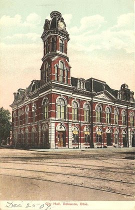 Sam wrote from Columbus, Ohio to Livy (continued from above): ....After the show (& a hot supper, Pond & I did play billiards until 2 a.m., & then I scoured myself in the bath, & read & smoked till 3, then slept till half past 9, had my breakfast in bed, & now have just finished that meal & am feeling fine as a bird [MTP]. Sam also complained again about Cable keeping “his program strung out to one hour, in spite of all” he could do. Sam was especially sick of Cable’s piece, “Mary’s Night Ride,” a sentimental episode at the end of Cable’s novel, Dr. Sevier, where Mary Richling crosses Confederate lines to reach her dying husband [LLMT 236]. And it is in every program. This pious ass allows an “entirely new program” to be announced from the stage & in the papers, & then comes out without a wince or an apology & jerks that same old Night Ride on the audience again [MTP].Mark Twain Day By Day
Sam wrote from Columbus, Ohio to Livy (continued from above): ....After the show (& a hot supper, Pond & I did play billiards until 2 a.m., & then I scoured myself in the bath, & read & smoked till 3, then slept till half past 9, had my breakfast in bed, & now have just finished that meal & am feeling fine as a bird [MTP]. Sam also complained again about Cable keeping “his program strung out to one hour, in spite of all” he could do. Sam was especially sick of Cable’s piece, “Mary’s Night Ride,” a sentimental episode at the end of Cable’s novel, Dr. Sevier, where Mary Richling crosses Confederate lines to reach her dying husband [LLMT 236]. And it is in every program. This pious ass allows an “entirely new program” to be announced from the stage & in the papers, & then comes out without a wince or an apology & jerks that same old Night Ride on the audience again [MTP].Mark Twain Day By Day
Wednesday, February 11, 1885: Oberlin, Ohio --First Congregational Church
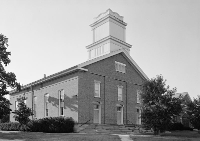 “The audience was cool, and the Weekly News charged that Twain had humbugged and swindled the people of Oberlin” (pg 58 Cardwell)
“The audience was cool, and the Weekly News charged that Twain had humbugged and swindled the people of Oberlin” (pg 58 Cardwell)
“Fourteen years later, when Twain published “The Man That Corrupted Hadleyburg,” citizens of Oberlin thought that their town was the prototype for Hadleyburg and that the writer was taking belated revenge for a bad press.” (pg 58 Cardwell)
See Touring with Cable and Huck for review.
Thursday, February 12, 1885: Detroit, Michigan--Whitney's
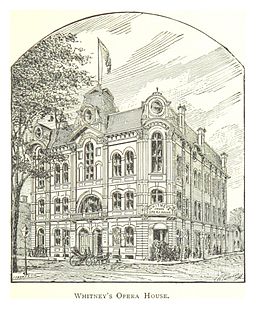 Sam and Cable gave a reading to a packed house at Whitney's Opera House, Detroit, Michigan. Even though there was a scheduling conflict with a high society event, the Light Guard’s Grand Levee Honors for Governor Russell A. Alger (1836-1907), and even though the thermometer had plummeted to 20 to 30 degrees below zero, “Luke Sharp” (Robert Barr, 1849-1912 ) of The Detroit Free Press reported the following Sunday that the audience was large and pleased [Denney 26]. George Cable wrote to his wife, Lucy: “Clemens found himself as heavy as lead—I mean in his own consciousness, and although the audience showed some heartiness of appreciation while he was before them, yet he came off disheartened, vexed & full of lamentations over his condition” [Turner, MT & GWC 101].
Sam and Cable gave a reading to a packed house at Whitney's Opera House, Detroit, Michigan. Even though there was a scheduling conflict with a high society event, the Light Guard’s Grand Levee Honors for Governor Russell A. Alger (1836-1907), and even though the thermometer had plummeted to 20 to 30 degrees below zero, “Luke Sharp” (Robert Barr, 1849-1912 ) of The Detroit Free Press reported the following Sunday that the audience was large and pleased [Denney 26]. George Cable wrote to his wife, Lucy: “Clemens found himself as heavy as lead—I mean in his own consciousness, and although the audience showed some heartiness of appreciation while he was before them, yet he came off disheartened, vexed & full of lamentations over his condition” [Turner, MT & GWC 101].
In Detroit, Mich. Sam wrote to George Iles.My Dear Iles: / I am so driven that I am obliged to cut correspondence down to telegrams; but I must drop just a line to thank you for your kindnesses & courtesies, {O, h—l, it’s platform time} —— Midnight.—P.S. I got your other telegram a while ago, & answered it, explaining that I have only a couple of hours in the middle of the day for social life. I know it doesn’t seem rational that a man should have to lie abed all day in order to be rested & equipped for talking an hour at night, & yet in my case & Cable’s it is so. Unless I get a great deal of rest, a ghastly dullness settles down upon me, on the platform, & turns my performance into work, & hard work, whereas it ought always to be pastime, recreation, solid enjoyment. Usually it is just this latter; but that is because I take my rest faithfully, & prepare myself to do my full duty by my audience. I am the obliged & appreciative servant of my brethren of the Snow-Shoe Club, & nothing in the world would delight me more than to come to their hours without naming time or terms on my own part—but you see how it is. My cast-iron duty is to my audience—it leaves me no liberty & no option. With my kindest regards & compliments to the Club & to you, I am ... [MTP].
Sam began a routine of eating his dinner late, this one at 11 P.M . [Feb. 13 to Livy, MTP].Mark Twain Day By Day
See Touring with Cable and Huck for review.
Friday, February 13, 1885: London, Canada--
At 9 A.M . Sam wrote from Detroit, Michigan to Livy, whose last letter transmitted a hint by some Hartford charity for Cable to perform for their benefit. Sam wanted no part of trying to coax or persuade Cable to donate his time. “I imagine that if a charity wants his in-his-opinion-almighty aid that charity will have to pay dollars for it.” Sam didn’t want Livy to allow herself, “to be in any way, directly or indirectly, concerned in the applying to him.” Sam recalled that Cable had charged a charity in New Orleans, and believed “he wouldn’t read in Heaven for nothing” [MTP].
Sam took the train for Canada where he and Cable gave a reading in London, Canada. In the audience were 151 girls, by Sam’s estimate, from Helmuth Female College [Cardwell 61]. After the lecture, Sam met many of the girls as well as the principal, who offered to send a sleigh for Sam and Cable in the morning if he would visit the college. Sam agreed [Feb. 15 to Susy Clemens]. Cable wrote that this reading was in the Y.M.C.A. hall [Turner, MT & GWC 104].Mark Twain Day By Day
Saturday, February 14, 1885: Toronto, Canada--Horticultural Gardens Pavilion
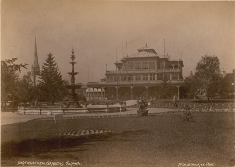 Sam was introduced to tobogganing by 74 young ladies from Helmuth Female College, “2 1⁄2 miles” out from town. It was twelve below zero. You sit in the midst of a row of girls on a long broad board with its front curled up, & away you go, like lightning....the sport was so prodigiously exciting & entertaining that it was well for us it was cut short by telephonic message that the train was being held for us; otherwise we should have tired ourselves to death...Tobagganing is very violent fun...[Feb. 15 to Livy; MTP].
Sam was introduced to tobogganing by 74 young ladies from Helmuth Female College, “2 1⁄2 miles” out from town. It was twelve below zero. You sit in the midst of a row of girls on a long broad board with its front curled up, & away you go, like lightning....the sport was so prodigiously exciting & entertaining that it was well for us it was cut short by telephonic message that the train was being held for us; otherwise we should have tired ourselves to death...Tobagganing is very violent fun...[Feb. 15 to Livy; MTP].
Sam and Cable gave a reading in Toronto, Canada, again at the Horticultural Gardens Pavilion. This time the audience was only half as large as their Dec. 8 and 9 sellouts a few weeks before [Roberts 22].Mark Twain Day By Day
Sunday, February 15, 1885:
While Sam most likely slept in, Cable attended morning service at a Toronto Methodist church, and again at a 3 PM Sunday school [Roberts 22].Mark Twain Day By Day
Monday, February 16, 1885: Brockville, Canada--Grand Opera House
In a Feb. 17 letter to Livy, Sam explained why he did not write on Feb. 16. On the train all day, Cable asked to borrow Sam’s writing pad. Though it was “pretty thin,” Sam thought there’d be enough. Cable wrote eight letters and used up the pad. “I was so disappointed & so mad that I spoke my mind rather freely—at least in manner, though not so much in words. (He has never bought one single sheet of paper or an envelop in all these 3 1⁄2 months—sponges all his stationery ... from the hotels. His body is small, but it is much too large for his soul” [MTP].
In the evening Sam and Cable gave a reading in Grand Opera House, Brockville, Canada. Cable wrote, “We did not read in Kingston. The appointment was changed to Brockville...” [Turner, MT & GWC 108].Mark Twain Day By Day
Tuesday, February 17, 1885: Ottawa, Canada--Opera House
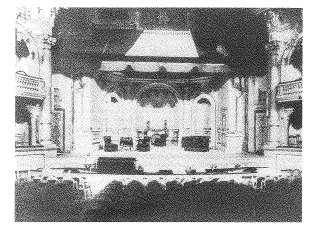 “He [Twain] informed Livy on the seventeenth that his companion was the 'pitifulest human louse' he had ever known” (pg 62 Cardwell)
“He [Twain] informed Livy on the seventeenth that his companion was the 'pitifulest human louse' he had ever known” (pg 62 Cardwell)
“Twain's festering canker apparently remained unknown to Cable,..” (pg 62 Cardwell)
"Mr. Clemens did not confine himself to “Huckleberry Finn,” but drew upon others of his works likewise, especially the veracious history of his travels in Europe known as “A Tramp Abroad.” Out of the kindness of his heart he also consented to throw in as an “extra” the pathetic story of the “Jumping Frog.” He is an older man than we expected to see, and both face and frame show signs of hard work, but he knows how to husband his resources, and is probably not half so tired by an evening's reading as he would by sitting out a dinner. In listening to him read you realize more fully than ever before the power of a single word. It was said that Garrick could move an audience to tears by the utterance of one word. Mr. Clemens certainly can move them to uncontrolled laughter by a single noun or adjective. His humour could hardly find a better interpreter than he is himself, and his most devoted readers must have discovered hitherto unsuspected brilliancy in even their favourite passages. "
Wednesday, February 18, 1885: Montreal, Canada--Queen's Hall
The official U.S. publication date for Adventures of Huckleberry Finn. [Hirst, “A Note on the Text” Oxford edition, 1996]. Note: other dates are sometimes given, for example, Budd in MT “Collected” gives Feb. 16 [978]. In the first month the book sold 42,000 copies [Willis 161]. By the year 2000, the book had sold perhaps twenty million copies and approximately 60 foreign editions [162]. Ozias Pond finally left Milwaukee and returned to New York [Cardwell 53]. En route from Ottowa to Montreal, Sam began a letter to Livy, to which he added a P.S. on Feb. 19 in Montreal. Sam stayed at the Windsor Hotel. “On board the train, Feb. 18/85. / This is a most superb winter morning—snow up to the fence-tops splendid sunshine, no wind, white smoke floating up in lazy columns from the scattered log houses, the distances vague & soft in a haze that is lightly tinted with blue” [MTP].
The Athenænum Club, a literary society of high rank, held a reception for the reading troupe at the Windsor from 4:30 to 6:00. Some 200 leading citizens, mostly ladies, were there to meet Sam and George. A long list of attendees was printed in the Feb. 19 Herald and Daily Commercial Gazette along with a notice for the next evening’s performance [Cardwell 62].Mark Twain Day By Day
"Probably not since the immortal Charles Dickens delighted the English speaking people of the old and new world with readings from his own works has there been an event in which the public take such an interest as the present reading tour of the S. L. Clemens and Geo. W. Cable. The Queen's hall last night was thronged with an appreciative and expectant audience. There is only one Mark Twain in the world who can write such genuine fun. Those who saw the performance last evening may come to the conclusion that there is only one who can really be a true exponent of that fun, and that man is Mark Twain himself. Nearly as much can be said for the distinguished novelist, Mr. Cable. There are a great many writers in the world—more than those whose works will ever be read—but few writers can appear before an audience and electrify and delight it by readings from the works of their own pen. Mr. Cable can do this, and in a manner which cannot be rivalled."
“Husky young club members seized Clemens, Cable, and the huge major [Pond] and tossed them repeatedly to the ceiling. Each of the visitors made speeches, Cable sang “Pov’ Piti Momzel Zizi,” club members sang a snowshoe song, and, finally, all joined in “God Save the Queen” [Cardwell 63].
The Brockville (Canada) Evening Recorder, p.1: “Mark Twain’s Wicked Moments.” A reporter wrote down some of Sam’s dinner-table conversation [Scharnhorst, Interviews 86].Mark Twain Day By Day
Thursday, February 19, 1885: Montreal, Canada--Queen's Hall
Sam’s P.S. to his Feb. 18 to Livy, simply added that he’d “talked here in Montreal last night.” Before the reading Sam wrote another letter to Livy, enclosing the itinerary for the tour for February. Livy had referred twice to an invitation sent Sam but he’d not heard of nor seen of one for “the Union for Home Work ladies.” If they wanted him to speak, he hoped it would be set for “some time in the first fortnight of March, so that” he would “still be fresh & not have to use a book” [MTP].
Cable wrote home that he received Dr. Louis Fréchette at 3 PM [Turner, MT & GWC 112].Mark Twain Day By Day
"Mark Twain and George W. Cable gave another entertainment last evening in the Queen's hall, which was, if possible, even more crowded than on the preceding night."
Charles C. DeZouche (1830-1896) wrote from Montreal: “Your ‘Tragical tale of a Fishwife’ [in “The Awful German Language” in A Tramp Abroad] last night reminded me that I, too, tried to learn German. It was years ago, and when I had crept in, about up to my ankles, I discovered words which looked badly, sounded badly, and almost smelled badly.” He included a poem with such words and then asked for Sam’s autograph [MTP]Mark Twain Day By Day
Friday, February 20, 1885: Saratoga, New York--Town Hall
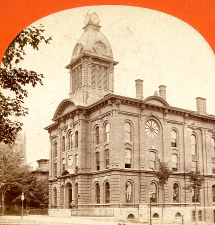 En route from Montreal to New York City Sam wrote to Livy. He’d sent a toboggan for the children but cautioned, “They better not try to use it till I come.” He wrote just as the train left the Lake Champlain area. You look miles & miles out over the frozen snow—white floor of the Lake, with the dazzling sun upon it, & huge blanket-shadows of the clouds gliding over it, & here & yonder a black spec on the remote level, & away on the far further shore a dim & dreamy range of mountains rises gradually up & disappears in a ragged, low-hanging leaden curtain of clouds [MTP].
En route from Montreal to New York City Sam wrote to Livy. He’d sent a toboggan for the children but cautioned, “They better not try to use it till I come.” He wrote just as the train left the Lake Champlain area. You look miles & miles out over the frozen snow—white floor of the Lake, with the dazzling sun upon it, & huge blanket-shadows of the clouds gliding over it, & here & yonder a black spec on the remote level, & away on the far further shore a dim & dreamy range of mountains rises gradually up & disappears in a ragged, low-hanging leaden curtain of clouds [MTP].
The Montreal Evening Star, p3: “Movements of Clemens and Cable.” A reporter was nearby when Sam chatted and toboganned with the college girls [Scharnhorst, Interviews 53-6]. (See Feb. 14 entry.) In the evening, Sam and Cable gave a reading in Town Hall, Saratoga, New York. Fatout reveals that “the Town Hall was so cold that the audience wrapped in ulsters and capes” [Circuit 228]. Clemens included: “Tragic Tale of the Fishwife,” “A Trying Situation,” and “A Ghost Story” [MTPO].Mark Twain Day By Day
"As to Mark Twain, it is needless to say that he carried the house by storm with his dry, infectious and irresistible humor. There is more in most of Twain's jests and humorous turns than in those of many humorists, in that they are almost all reinforced by auxilliary [sic] or sub-jokes, an annex, as it were to each joke, so that you hardly catch the report of one and begin to enjoy it when, like an echo, or a reverberation, or rather, like a repeating rifle, along come other jokes following close on the heels of their file leaders, (our metaphor is a little mixed) and each one apparently healthier and heartier than its predecessor. He will string more wit, and jokes, and humor, and fun on a single climacteric sentence than any one that we know of. And what a style the man has. It inspires confidence in the absolute unreliability of what he is going to say, the moment he appears on the platform and gravely takes you in with his severely sober but twinkling glance. He makes you the confidant of his villainies and his trials in a way that you cannot resist, and when the cold-blooded wretch has compromised you, he has you at his mercy and you can't get away, and he knows it. The first thing he did last night was to gain the sympathy of his dupes by reciting to them his struggles with German genders. Then he gave the details and disasters of a “little game” that he attempted to practice on an unprotected female in Switzerland; and then he recounted his experience in Nevada as a “fighting editor,” which must have made some of the Saratoga fighters burn with jealousy as he displayed the bloodthirsty traits in his editorial character. The entertainment was concluded with a blood-curdling ghost story which fairly startled his audience out of their seats."
Saturday, February 21, 1885: New York, New York--Academy of Music
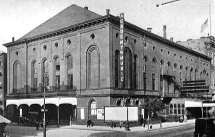 Upon arriving in New York, Sam and Cable breakfasted with Ozias Pond and his wife, Nella. He inscribed a copy of the newly published Huck Finn for Ozias, whose health had improved [Cardwell 64]. Sam then immediately made his way to the home of General Grant, hopeful that Grant’s memoirs would be given to Webster & Co. [Perry 137]. Grant confirmed that he, his son, and George W. Childs had been negotiating with Webster, since Sam’s last call (see Nov. 20, 1884 entry). “I mean you shall have the book—I have made up my mind about that,” Grant said [138]. The bad news was the doctors gave Grant “only a few weeks to live.” (See Perry’s Grant and Twain for the full story.) Sam went straight to the offices of his nephew, Charles Webster, and directed him to finish the details on the Grant contract and deliver it to his home. Sam agreed to hire a stenographer to help Grant finish the work. Noble E. Dawson was chosen—he’d been with Grant in Mexico [Perry 140-1].Mark Twain Day By Day
Upon arriving in New York, Sam and Cable breakfasted with Ozias Pond and his wife, Nella. He inscribed a copy of the newly published Huck Finn for Ozias, whose health had improved [Cardwell 64]. Sam then immediately made his way to the home of General Grant, hopeful that Grant’s memoirs would be given to Webster & Co. [Perry 137]. Grant confirmed that he, his son, and George W. Childs had been negotiating with Webster, since Sam’s last call (see Nov. 20, 1884 entry). “I mean you shall have the book—I have made up my mind about that,” Grant said [138]. The bad news was the doctors gave Grant “only a few weeks to live.” (See Perry’s Grant and Twain for the full story.) Sam went straight to the offices of his nephew, Charles Webster, and directed him to finish the details on the Grant contract and deliver it to his home. Sam agreed to hire a stenographer to help Grant finish the work. Noble E. Dawson was chosen—he’d been with Grant in Mexico [Perry 140-1].Mark Twain Day By Day
Sam and Cable gave a reading in the Academy of Music, Brooklyn, New York.
IN THE ACADEMY OF MUSIC.
Mark Twain and George W. Cable Entertain a Brooklyn Audience
"The Academy of Music was well filled last night by an audience which was entertained by Mark Twain and George W. Cable. It is not long since these gentlemen visited Brooklyn, but they have entirely failed to exhaust their welcome. Both readers were in excellent humor, their drolleries competing with the more pathetic efforts by which the programme was diversified. The latter was as follows: "Narcisse Puts on Mourning for Lady Byron," Mr. Cable; "Huck Finn and Tom Sawyer's Brilliant Achievement," Mark Twain; "Aurore and Honore" (courtship scene), Mr. Cable; "The Blue Jay's Mistake," Mark Twain; "Mary's Night Ride," Mr. Cable; "The Jumping Frog," Mark Twain."
Sunday, February 22, 1885:
Monday, February 23, 1885: New Haven, Connecticut --Opera House
 Sam and Cable gave a reading at the Opera House in New Haven, Conn. [New Haven Evening Register for Feb. 18, 21 and 23].Mark Twain Day By Day
Sam and Cable gave a reading at the Opera House in New Haven, Conn. [New Haven Evening Register for Feb. 18, 21 and 23].Mark Twain Day By Day
Tuesday, February 24, 1885:
Wednesday, February 25, 1885:
Cable’s Feb. 26 letter home:Had a great time in Newark last night; one of the finest nights we have had for some ten days. Orange [NJ] was very poor—i.e. the audience was slim; which was a great surprise to us & not to be accounted for[Turner, MT & GWC 113]. Note: Although not listed in Railton or Schmidt, it seems from this letter that the men read in both places, probably a matinee and an evening performance.Mark Twain Day By Day
Thursday, February 26, 1885: Philadelphia, Pennsylvania --Academy of Music
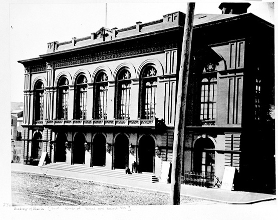 Sam saw Nat Goodwin, actor and vaudevillian, on the train going to Philadelphia. Goodwin told Sam he was “very anxious to play” the Sellers as Scientist [Feb. 27 to Howells]. In the evening Sam and Cable gave a reading to an audience of about 3,000 at the Academy of Music in Philadelphia, Penn. Clemens included: “A Dazzling Achievement,” “Tragic Tale of the Fishwife,” “Incorporated Company of Mean Men,” and “The Bluejay’s Mistake” [MTPO].
Sam saw Nat Goodwin, actor and vaudevillian, on the train going to Philadelphia. Goodwin told Sam he was “very anxious to play” the Sellers as Scientist [Feb. 27 to Howells]. In the evening Sam and Cable gave a reading to an audience of about 3,000 at the Academy of Music in Philadelphia, Penn. Clemens included: “A Dazzling Achievement,” “Tragic Tale of the Fishwife,” “Incorporated Company of Mean Men,” and “The Bluejay’s Mistake” [MTPO].
Fatout, citing Pond’s finance records says the $918 take reflected a crowd of one thousand [Circuit 218].
From Cable to his wife on Feb. 27:It was the finest sight I have ever looked at from the platform. And I had great success. As to Mark his was not up to high water mark though — excuse me, the pun was accidental — he created much enthusiasm. I don’t see what is the matter with him except that he seems tired out. [Turner, MT & GWC 113].Mark Twain Day By Day
See Touring with Cable and Huck for review.
Friday, February 27, 1885: Baltimore, Maryland. --
Sam wrote from Philadelphia to William Dean Howells:To-night in Baltimore, to-morrow afternoon & night in Washington, & my four-months platform campaign is ended at last. It has been a curious experience. It has taught me that Cable’s gifts of mind are greater & highter than I had suspected. But— That “But” is pointing toward his religion. You will never know, never divine, guess, imagine, how loath-some a thing the Christian religion can be made until you come to know & study Cable daily & hourly. Mind you, I like him; he is pleasant company; I rage & swear at him sometimes, but we do not quarrel; we get along mighty happily together; but in him & his person I have learned to hate all religions. He has taught me to detest the Sabbath-day & hunt up new & troublesome wasy to dishonor it [MTP].
Sam planned to return to New York City on Monday and stay one or two days, “mainly at Webster’s office,” so he asked Howells if he’d write him there (Sam was in Washington, D.C. on Monday, Mar. 2, but may have left that day for New York.) Sam and Cable traveled to Baltimore, Maryland, where they gave a reading at the Oratorio Hall. Clemens included: “A Dazzling Achievement,” “A Ghost Story,” “Jumping Frog” and “The Bluejay’s Mistake” [MTPO].Mark Twain Day By Day
See Touring with Cable and Huck for review.
Saturday, February 28, 1885: Washington, D.C.--Congregational Church
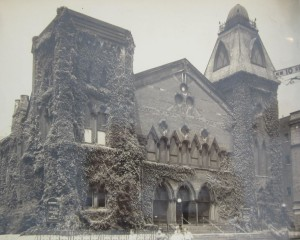 Sam and Cable read at the Congregational Church, Washington, D.C.
Sam and Cable read at the Congregational Church, Washington, D.C.
Note: Fatout gives figures from Pond’s cashbook, listing $789 as the take from this reading [Circuit 218]. Thus ended the “Twins of Genius” tour: total gross receipts, $46,201, from which Cable’s salary and expenses took more than $20,000. Cable earned $6,750, Sam approximately $15,000, and Pond’s commissions “a modest $2500 to $3000” [228].Mark Twain Day By Day
See Touring with Cable and Huck for review.
- Log in to post comments